Unit10 Where did you go on vacation英文说课稿
初中英语备课参考 Where did you go on vacation (3)

Unit 10 Where did you go on vacation?Section A1. Where did you go on vacation?(假期你去哪儿了?)(1)这是一个一般过去时的特殊疑问句,其句式结构为:特殊疑问词+一般疑问句。
句中did是助动词do的过去形式。
(2)on vacation意为“度假”相当于on holiday,但vacation指长假take a vacation休假一次the long summer vacation长假/暑假2. “访问某地”“游览某地”的表达。
go to someplacevisit someplacepay a visit to someplace注意:visit sb. pay a visit to sb.表示“去看/访问某人”3. How was your vacation, Lin?琳,你的假期怎样?How为疑问副词,用于疑问句,其意为“如何,怎样”类似的用法还有:How’s the weather?How’s it going?How are you?How do you know him?How do you spell the word?How do you get there?How does she study English well?4. unfriendly的构词方式Δun-friendly友好的unfriendly不友好的lucky幸运的unlucky不幸运的Δin-expensive贵的inexpensive便宜的formal正式的informal非正式的Section B1. It was sunny and hot all day.整天都阳光明媚,暖洋洋的。
it指代天气,all与表示时间的单数名词连用,表示“全”“整个”all day整天2. We had great fun playing in the waves.我们在海浪中尽情玩耍。
7年级Unit10Where did you go on vacation
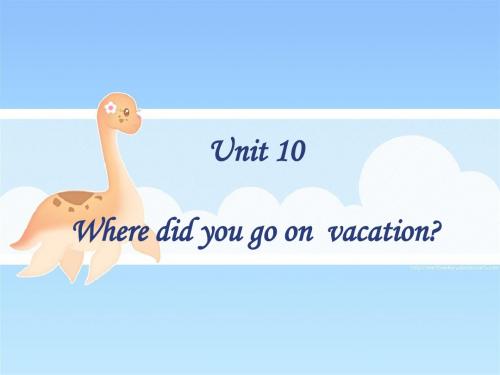
What did these people think of their vacations ?
Role play
Listen to Vera talking about her vacation. Answer these questions.
1. Where did Vera go on vacation? 2. Did Vera like her vacation?
Listen again and fill in chart.
What does Vera think about:
Pairwork
Nancy,where did you go on vacation ?
Oh,really?Did you go to Central Park ?
I went to New York City.
Task 调查你的几位好朋友,谈论他们最 难忘的假期,并选其中的ቤተ መጻሕፍቲ ባይዱ位作汇报.
Where did you go on vacation? I… When did you go? What did you do? Did you … ?
Homework
Let’s do our homework.
Make a survey 调查自己家人和朋友的一次难忘的假期,并 收集他们的相关照片建立“Vacation Album”.
Xiang Hua
Sally
Brad
Tom
Guess: Where did I go over the weekend? Did you go shopping? Yes, I did. No, I didn’t.
I stayed at home and watched TV.
Where did you go on vacation 知识详解-英语八年级上册(人教版)
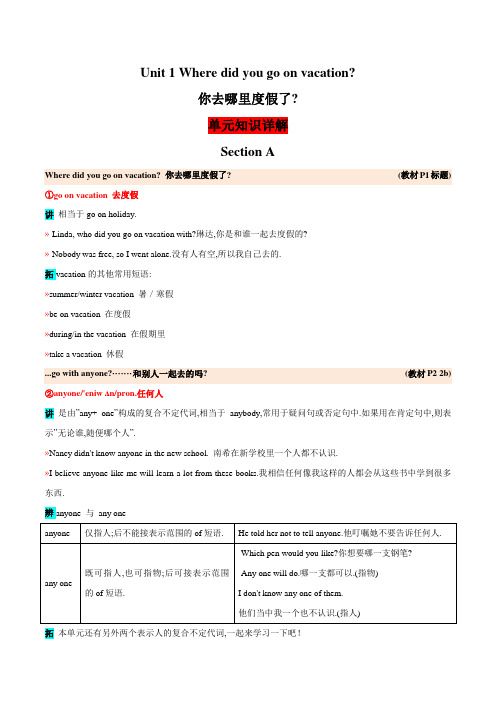
Unit 1 Where did you go on vacation?你去哪里度假了?单元知识详解Section AWhere did you go on vacation? 你去哪里度假了? (教材P1标题) ①go on vacation 去度假讲相当于go on holiday.»-Linda, who did you go on vacation with?琳达,你是和谁一起去度假的?»-Nobody was free, so I went alone.没有人有空,所以我自己去的.拓vacation的其他常用短语:»summer/winter vacation 暑/寒假»be on vacation 在度假»during/in the vacation 在假期里»take a vacation 休假...go with anyone?·······和别人一起去的吗? (教材P2 2b) ②anyone/'eniwʌn/pron.任何人讲是由”any+ one”构成的复合不定代词,相当于anybody,常用于疑问句或否定句中.如果用在肯定句中,则表示”无论谁,随便哪个人”.»Nancy didn't know anyone in the new school. 南希在新学校里一个人都不认识.»I believe anyone like me will learn a lot from these books.我相信任何像我这样的人都会从这些书中学到很多东西.辨anyone 与any one拓本单元还有另外两个表示人的复合不定代词,一起来学习一下吧!典例1 (泰州中考改编)-Is there________ in the classroom?-It's empty(空的).________ is listening to a speech in the school hall.A. anyone; AnyoneB. anyone; EveryoneC. everyone; AnyoneD. everyone; Everyone解析:句意:"教室里有人吗?""教室里没人,所有人都在学校礼堂听演讲."第一空表示"有人,任何人",且该句为疑问句,应用anyone;第二空表示"所有人”,且位于句首,应用Everyone.故选B.Oh, did you go anywhere interesting?噢,你去什么有意思的地方了吗? (教材P2 2d) ③anywhere/'eniweə/,/'eniwer/adv.在任何地方讲地点副词,常用于否定句和疑问句中,代替somewhere.如果用在肯定句中,则表示"无论何处,随便哪个地方".»I can't find my pen anywhere.我到处都找不到我的钢笔.»You can buy clothes like these anywhere.这样的衣服到处都可以买到拓含where的其他地点副词;典例2(云南中考改编)-Hello, Jenny. I can't find my math book________. Did you see it?-Sorry, I didn't.A. anywhereB. somewhereC. nowhere解析:句意:"你好,珍妮.我到处都找不到我的数学书.你看到它了吗?""抱歉,我没看到."根据"Did you see it?"可知,说话者找不到数学书,否定句中应用anywhere.故选A.It was wonderful!它太美了!(教材P2 2d) ④wonderful/'wʌndə(r)fl/adj.精彩的;绝妙的讲由"wonder(n.惊叹;惊奇)+-ful(形容词后缀)"构成.»What a wonderful 4-D film it is!多么精彩的一部4D电影啊!词缀学习-ful可用于构成形容词,意为"充满······的;有·····性质(或倾向)的”,其反义词缀为" -less".如:»care (n. 小心) +-ful=careful(adj.小心点,仔细的)»care (n. 小心) +-less=careless(adj.粗心的,不仔细的)»help(n.帮助)+-ful=helpful(adj.有帮助的)»help(n.帮助)+-less=helpless(adj.无助的)»use(n.用途)+-ful=useful(adj.有用的)»use(n.用途)+-less=useless(adj.无用的)We took quite a few photos there.我们在那里拍了很多照片. (教材P2 2d) ⑤ quite a few 相当多;不少讲相当于many,修饰可数名词复数.»Quite a few students took part in the sports meeting held in our school.很多学生参加了在我们学校举办的运动会.拓quite a little相当多;不少相当于much,修饰不可数名词.»We had quite a little bread for breakfast.我们早餐吃了相当多的面包.What about you?你呢? (教材P22d) ⑥What about...?讲意为”·····呢?/······怎么样?",可与"How about...?"互换,其中about 为介词,后接名词、代词或动词-ing 形式.具体用法如下:(1)用来询问信息或情况.»-I'm a student. What about you?我是学生,你呢?»-What about the apples?这些苹果怎么样?-They're fresh.它们很新鲜.(2)用来向对方提出建议.»-We are free this Saturday. What about visiting the museum?本周六我们有空.参观博物馆怎么样?-Sounds great.听起来很棒.拓常用的表示提建议的句型还有;»Let's do sth.!我们做某事吧!»Why not do sth.?为什么不做某事呢?»Why don't you do sthi?.你为什么不做某事呢?»Shall we do sth.?我们做某事好吗?»Would you like sab./to do st.?你想要某物/做某事吗?»You'd better do sth,你最好做某事.典例3(2022·绥化中考)What about________ the song Together for a. Shared Future? Its name is the slogan(口号)of the Beijing 2022 Olympic Winter Games,A. singB. singingC. to sing解析:What about后的动词应用其-ing形式,故选B.I just stayed at home most of the time to read and relax.我大部分时间只是待在家里看书、休息. (教材P2 2d)⑦most/məust/ adj.,adv.& pron.最多;大多数讲(1)[代词]大多数可代指可数名词或不可数名词,常与of连用.»Most of my friends like pop music.我的大多数朋友喜欢流行音乐.»Most of the building is yellow.这座大楼的大部分是黄色的.(2)[形容词](数量上)最多,最大是many和much的最高级,后可跟可数名词复数或不可数名词.»Who do you think will get the most votes? 你认为谁会得到最多的选票?»Lingling gets the most money of the three.三个人当中玲玲得到的钱最多(3)[形容词]大多数,大部分后可跟可数名词复数或不可数名词.»Most people agree that honesty is a good thing.大多数人都认为诚实是一件好事.(4)[副词](程度上)最大/多/高用来修饰动词.»Jiaozi is what I miss most when I'm abroad.饺子是我在国外时最想念的食物.Yes, I bought something for my father.是的,我给我爸爸买了一些东西. (教材P3Grammar Focus) ⑧ something/'sam0mn/pron.某事;某物讲复合不定代词,常用于肯定句中.作主语时,谓语动词用单数形式.»Linda, I want to tell you something about the school trip.琳达,我想告诉你一些关于学校旅行的事情.»Something is wrong with my new computer.我的新电脑出故障了.拓含thing的其他复合不定代词:特别提醒在表示请求、建议或期望得到肯定回答的疑问句中,常用something,而不用anything.-Would you like something to drink, Judy? 你想要喝点什么吗,朱迪?-Yes, Some milk is OK.好的,一些牛奶就行.典例4(2022·常州中考)Learning is a lifelong journey, for it brings us_______ new every day,A. everythingB. nothingC. anythingD. something解析:由前半句"学习是终身的旅程"可推知,此处是说"因为它每天都给我们带来新的东西",故用something表示"某事/物”,选D.Everything tasted really good!所有的食物尝起来都很好吃!(教材P3 Grammar Focus) ⑨taste v.有····味道讲[连系动词]有······味道后接形容词作表语,通常不用于进行时.»She knows it's not good for her, but it tastes good!她知道这对她的健康不利,但它(冰激凌)很好吃拓(1)[及物动词]尝出»You can taste the garlic in this stew.在这炖菜里你可以尝出大蒜的味道.(2)[名词]味道;欣赏力»I like the taste of olives.我喜欢橄榄的味道.»Mary has good taste in clothes.玛丽在服装方面有很好的欣赏力.语境串记The cook tastes(v.品尝)the soup. Wow! It tastes(v.尝起来)delicious. It has a good taste(n.味道).厨师尝了尝汤.哇!它尝起来很美味.它的味道很好.归纳总结常用的表示感官的连系动词有:look看起来sound听起来feel摸起来smell有······气味taste有····味道典例5(2022·泸州中考)-Paul, have you tried this chicken? It's a special in Luzhou and has been introduced in the TV program A Bite of China.-Yes, it________ hot but delicious.A. eatsB. looksC. tastesD. sees解析:句意:"保罗,你尝过这种鸡吗?它是泸州的特色菜,在电视节目《舌尖上的中国》中也有介绍.””尝过,它很辣,但味道很好.”由"Paul,have you tried this chicken?"及其肯定回答”)”可知,保罗尝过这种鸡,此处应该是评Yes"可价其味道,故用tastes,选C. eat 和see 都是实义动词,后面不能接形容词.How did you like it?你觉得它怎么样? (教材P3.3a) ⑩ How do you like.,,?讲意为"你(们)觉得·····怎么样?",用于询问对方的观点或看法.其同义表达有:»What do you think of...?»How do you feel about...?»-How do you like this cup of Xinglong coffee?你认为这杯兴隆咖啡怎么样?-It tastes really great. I'd like another cup.它尝起来很不错.我想再来一杯.Of course!当然!(教材P3 3a) ⑪of course 当然;自然讲肯定答语,相当于sure/certainly.若表示"当然不",要用of course not.»-Can you help me to repair my computer?你能帮我修一下电脑吗?-Of course/Sure/Certainly,当然可以.»-It's cold outside. Would you mind closing the window?外面很冷,你介意关一下窗户吗?-Of course not, I will do it at once.当然不介意.我马上关.典例6 (扬州中考)-Are your parents against(反对)your leaving home to work in Shanghai?-________. They say there are more chances in big cities.A. Don't mention ifB. Of course notC. That's all rightD. With pleasure解析:Don't mention it"不客气";Of course not“当然不”;That's all right"没关系”:With pleasure"很乐意".问句句意;你的父母反对你离开家到上海工作吗?根据答句中的"他们说大城市的机会更多"可知,B项符合题意.I bought something for my parents ,but nothing for myself.我给我父母买了一些东西,但是什么也没给我自己买. (教材P33a) ⑫myself/mai'self/pron.我自己;我本人讲为反身代词,由"my+self"构成.»When I face difficulties, I always say to myself,”Never give up!"当我面临困难时,我总是对自己说:”永不放弃!”»I can discuss questions and express myself in simple English.我能用简单的英语讨论问题和表达自己.归纳总结反身代词的构成规律:特别提醒反身代词不能作主语,多用于动词或介词后作宾语,表示"某人自己".(all)by oneself意为"(某人)独自,单独".He learned to ride a bicycle by himself.他自己学会了骑自行车.典例7用所给词的适当形式填空.(2022·龙东中考)I always tell________(I) not to give up every time I fail.解析:句意;每次我失败的时候,我总是叮嘱自己不要放弃.空处与主语1人称相同,指代的是"我”,即"自己",应用反身代词,故填myself.The only problem was that there was nothing much to do in the evening but read.唯一的问题是晚上除了看书没有什么事可做. (教材P3 3b) ⑬ there's nothing to do but...除了······之外,没有什么事可做讲相当于"sb, has nothing to do but...".需要注意的是,在这两个结构中,当but前面有实义动词do时,but后通常用不带to的动词不定式;否则,用带to的动词不定式.»There was nothing to do yesterday afternoon but watch news on TV.昨天下午除了在电视上看新闻外,没有什么事可做.»I had nothing to say but to keep silent.我没有什么可说的,只有保持沉默.Still no one seemed to be bored.不过似乎没有人感到厌烦. (教材P3 3b) ⑭seem(to be)+n./adj.似乎·····;好像······»Tom seems(to be) a very clever boy.汤姆似乎是一个非常聪明的男孩.»Computers and rockets seemed impossible 100 years ago.100年前,计算机和火箭似乎是不可能的.拓seem的其他用法:(1)seem like+n.似乎······;好像·····»Jack seems like a good boy,杰克似乎是个好孩子.(2)lt-seems like+从句.似乎·····;仿佛······»It seems like everything has been greatly improved.似乎一切都得到了很大的改善.(3)seem to do sth.似乎做某事;好像做某事»You seem to get lost. Need help?你好像迷路了.需要帮助吗?(4)It seems/seemed+(that)从句看来好像/似乎······该句型通常可与seem to do sth.进行同义转换.»It seems that no one knows the news, =No one seems to know the news.似乎没有人知道那个消息.⑮bored/bo:(r)d/adj.厌倦的;烦闷的讲[形容词]be/feel/get bored with 对···感到厌烦»Finally, Steve felt too bored with the game.最后,史蒂夫十分厌烦这个游戏.辨bored 与boring语境串记Doing the boring housework makes me feel bored.做这些无聊的家务令我感到厌倦.归纳总结在英语中,以-ed结尾的形容词通常用来描述人,表示“感到······的”;以-ing结尾的形容词通常用来描述事物,表示“令人······的".常见的还有:典例8(黄石中考)In the future, robots will do________ jobs in place of people in order not to get us________.A, bored; bored B. boring; boring C. boring; bored D. bored; boring解析;句意;将来,为了不让我们感到厌倦,机器人将代替人们做令人厌烦的工作.第一空修饰jobs,表示"令人厌烦的",用boring;第二空描述人的主观感受,表示“厌倦的”,用bored.故选C.Section BWhat activities do you find enjoyable?你认为什么活动是有乐趣的? (教材P5 2a) ①activity/æk'tivəti/n.活动讲[可数名词]复数形式是变y为i再加-es,即activities.»Students should take part in many outdoor activities.学生们应该参加许多户外活动.②enjoyable/in'd3oəbl/adj.有乐趣的;令人愉快的讲[形容词]由"enjoy(v.享受······的乐趣;喜爱)+-able(形容词后缀)"构成.»Skipping is an enjoyable form of exercise.跳绳是一种有趣的锻炼方式.»For Tony, nothing is more enjoyable than playing tennis.对托尼来说,没有什么比打网球更令人愉快的了.拓与enjoy相关的词:»enjoy v.享受·····的乐趣;喜爱»enjoyable adj.有乐趣的;令人愉快的»enjoyment n.乐趣;乐事»enjoyably adv.令人愉快地词缀学习-able表示"可以······的;具有······性质的”,常加在某些动词或名词的后面,构成形容词.如:»comfort(n.舒适)+-able→ comfortable(adj.舒适的)»fashion(n. 时尚,时兴)→fashionable(adj.时髦的)It was sunny and hot, so we decided to go to the beach near our hotel.这里天气晴朗且炎热,因此我们决定去靠近旅馆的海滩. (教材P5 2b) ③decide/dr'said/v.决定;选定讲decide(not) to do sth.决定(不)做某事decide+"特殊疑问词+不定式"decide+宾语从句»He decided to help the people in need.他决定帮助那些需要帮助的人.»He cannot decide when to leave.他不能决定何时离开.»I can't decide where I should go.我不能决定我该去哪儿.拓decision[名词]决定;抉择»make a decision =decide 做决定»I made a decision(=decided) to read English every day,我决定每天读英语.典例1根据句意及首字母提示填写单词.(2022·自贡中考)After he thought twice, he d_______ to become a teacher in a poor village after college.答案:decidedMy sister and I tried paragliding.我和妹妹尝试了滑翔伞运动. (教材P5 2b)④ try/traɪ/v.&n.尝试;设法;努力(1)[及物动词]尝试;设法;努力后常接名词、代词、动词-ing或不定式作宾语.»He tried his fortune in another city.他在另一座城市碰碰运气.(2)[可数名词]尝试常用单数形式.»have a try/give it a try 试一试»She didn't manage to break the record, but it was a good try.她没能打破纪录,但这是一次很好的尝试.»That's not difficult. You can have a try.那不难,你可以试一下.辨try to do sth.与try doing sth.»They are trying to solve this problem.他们正在努力解决这个问题.»Tom is trying solving this problem in this way.汤姆正在尝试用这种方法解决这个问题典例2(江西中考)The food is very delicious in that restaurant. We could go and_________ it.A. sellB. helpC. produceD.try解析:句意:那家餐馆的食物非常美味.我们可以去尝试一下.Sell”卖”;help"帮助";produce"生产";try"尝试".根据语境可知选D.I felt like I was a bird.我感觉自己像一只鸟. (教材P5 2b)⑤ feel like 给······的感觉;感受到讲后常接名词、动词-ing或从句.»I feel like a fish in the sea.我感觉自己像大海里的一条鱼.»The 3-D film can make you feel like being in the real situation.3D 电影能给你一种处于真实环境的感觉.»He felt like he was a giant in the country of dwarfs.在侏儒国他感觉自己像个巨人.拓还可意为"想要".feel like sth./feel like doing sth.想要某物/想做某事»Do you feel like another drink?你想再喝一杯吗?»He slept badly and didn't feel like eating.他睡眠不好,并且不想吃东西.There are a lot of new buildings now, but many of the old buildings are still there.现在那里有许多新的建筑,但是很多古老的建筑依然存在. (教材P5 2b) ⑥ building/'bɪldɪŋ/n.建筑物;房子讲[可数名词]由"build(v.建造)+-ing(后缀)”构成.»There is an old building in front of our school.我们学校前面有一座旧建筑.拓build+-er→ builder n.建筑者,建筑工人build v建造,建筑building n.建筑物,房子builder n.建筑者语境串记Look! Some builders are working hard to build the tall building.看!一些建筑工人正在辛苦工作,建造那座高楼.I wonder what life was like here in the past.我想知道过去这里的生活是什么样子的. (教材P5 2b)⑦ wonder/'wʌndə(r)/v.想知道;琢磨高频讲[及物动词]相当于want to know.用法如下:wonder+"特殊疑问词+动词不定式"wonder+ who/what/how/when引导的宾语从句wonder+ if/whether引导的宾语从句»After reading so much, you may wonder how to make a book.读了这么多书之后,你可能想知道如何写一本书. »Rose is wondering who did the washing. 罗丝想知道谁洗了衣服.»They wonder if robots will think like a human in 25 to 50 years.他们想知道在25到50年后机器人是否会像人一样思考.拓还可作名词.惊讶,惊奇(不可数名词) 奇迹,奇观(可数名词)»I was listening to his story with wonder.我吃惊地听着他的故事.(不可数名词)»The Great Wall is one of the seven wonders around the world.长城是世界七大奇迹之一. (可数名词)I really enjoyed walking around the town.我很喜欢在这个镇上到处走走. (教材P5 2b)⑧enjoy v.喜爱;享受······的乐趣讲[及物动词]enjoy sth.喜欢某物enjoy doing sth.喜欢做某事enjoy oneself 玩得高兴;过得愉快»It(The library) is very quiet and I enjoy reading there.它(图书馆)非常安静,我喜欢在那里读书.»We enjoyed ourselves at the English party. Last weekend.我们在上周末的英语聚会上玩得很开心.典例3用所给词的适当形式填空.(2023·清华大学附属中学朝阳学校期中改编)My grandfather wants to travel around the world because he enjoys________ (see)new places.解析:句意:我爷爷想要环游世界,因为他喜欢看新地方.enjoy doing sth."喜欢做某事"为固定结构,故填seeing. What a difference a day makes!一天的差异真大呀!(教材P5 2b) ⑨ difference/'difrəns/n.差别;差异讲[可数名词]&[不可数名词]make a difference(to...)(对···)有影响;(对······)有作用»There is very little difference between the two books.这两本书差别很小.(不可数名词)»The two sweaters look the same but there is a big difference in price.这两件毛衣看起来一样,但是价格大不相同.(可数名词)»Small actions make a difference. Each of us can play a part.小行动也会产生影响.我们每个人都可以发挥作用. 拓difference n. 差别;差异different adj.不同的;有差异的differently adv.不同地语境串记Please look at the two different pictures, class, and circle the differences between them.同学们,请看这两幅不同的图片,并圈出它们之间的不同之处.⑩what引导的感叹句讲what引导的感叹句的具体结构有;What+a/an+adj.+可数名词单数(+主语+谓语)!What+adj.+可数名词复数/不可数名词(+主语+谓语)!»What a beautiful girl she is!她是一个多么漂亮的女孩呀!»What exciting news it is!多么令人兴奋的消息呀!拓how也可引导感叹句,其具体结构有:How +adj. /adv.(+主语+谓语)!How+adj.+a/an+可数名词单数(+主语+谓语)!How+主语+谓语!»How wonderful the music is!多么优美的音乐呀!»How beautiful a painting it is!它是一幅多么美的画啊!»How time flies!时光飞逝!特别提醒What+a/an+adj.+可数名词单数(+主语+谓语)!"可与"How+adj.+a/an+可数名词单数(+主语+谓语)!"相互转换.What a kind teacher she is!= How kind a teacher she is!她是一个多么善良的老师啊!巧学妙记感叹句歌诀感叹句,不麻烦,how或what在最前.修饰名词用what, how与形、副紧相连.主语、谓语不用变,省掉它们很常见.典例4 (2022·海南中考改编)-_______ beautiful poem Happy Rain on a Spring Night is!-So it is!A, How B. What a C. What解析:句意:《春夜喜雨》是首多么优美的诗呀!""确实如此!"感叹名词应用what,且poem为可数名词,其前应用不定冠词修饰,再由beautiful 以辅音音素开头可知,不定冠词应用a.故选B.We wanted to walk up to the top, but then it started raining a little so we decided to take the train.我们想步行至山顶,但是后来天开始下起了小雨,因此我们决定乘火车去. (教材P5 2b) ⑪ top/tɒp/,/ta:p/n.顶部;表面讲(1)[名词]顶部(此处义项)on/at the top of 在······顶部»There is a bird on the top of the house.房顶上有一只鸟.»Please write your name at the top of the page.请在页面上端写下你的名字.(2)[名词]表面»Can you polish the top of the table?请把桌面擦亮好吗?拓[形容词](位置、级别或程度)最高的通常位于名词前作定语.»Peking University is one of the top universities in China.北京大学是中国顶尖大学之一.⑫start doing sth.开始做某事讲其同义短语有:start to do sth. begin to do sth. begin doing sth.»The baby started crying after her mom left.妈妈离开后,这个婴儿开始哭了起来.⑬ a little一点儿We waited over an hour for the train because there were too many people.因为人太多,我们等了一个多小时的火车. (教材P5 2b) ⑭ wait/weit/v.等待;等候讲wait for sb./sth.等待某人/某事物wait(for sb./sth.)to do sth.等着(某人/某物)做某事can't wait to do sth.迫不及待地想做某事»wait a minute/moment/second稍等一下»谚Time and tide wait for no man.时光不等人.语境串记We are waiting for my father to have dinner. However, he is waiting for a bus. I can't wait to eat. But Mom says," Wait a moment."我们在等爸爸吃饭.然而,他在等公共汽车.我迫不及待地想吃饭,但是妈妈说:"等一会儿.”⑮over prep.超过;多于»These toys are suitable for children over the age of three,这些玩具适合3岁以上的儿童.拓over作介词时的其他常见用法:从一边到另一边There is a bridge over the river.河上有一座桥.在······上方 A lamp hangs over the table.一盏灯悬挂在桌子上方遍及They've travelled all over the world.他们游遍了全世界通过We heard the news over the radio.我们是从广播中听到这个消息的.⑯ too many 太多辨too many, too much 与much too巧学妙记 too many 、too much 、much too,三者重心在尾部;many 后接名词复,much 要接不可数;too 后只接形或副,理解实质好记住.典例5(安顺中考)My cousin is_______ heavy because he often eats_______ fast food.A. too much; too manyB. too many; too muchC. much too; too muchD. too much; much too解析:句意;我堂弟太胖了,因为他经常吃太多快餐.第一空处修饰形容词heavy,应用much too;第二空处修饰不可数名词food,应用too much.故选C.And because of the bad weather, we couldn't see anything below.并且因为天气不好,我们看不到下面的任何风景.(教材P5 2b) ⑰ because of 因为辨because 与 because of»I often go to the art museum because I like painting.我经常去美术馆,因为我喜欢画画.»I like the boy because of his kind nature.我喜欢这个男孩,因为他秉性善良.拓 一般情况下,含because 和含because of 的句子可以互相转换.»He didn't come to school today because he was ill( = because of his illness).他今天没来学校是因为他生病了. 典例6(2022·齐齐哈尔中考)-Why do you have time to look after the homeless dogs?-________the "double reduction" policy("双减"政策),I have more free time.A. Because ofB. Even thoughC. As for解析;句意:"你为什么有时间照顾流浪狗?"“由于”双减”政策,我有了更多的空闲时间.”空后是名词短语,空处应用短语介词;根据问句中的Why 可知,此处表示"由于",应用"Because of".故选A.⑱ below/br'ləu/ prep.& adv.在······下面;到······下面讲(1)[副词](此处用法)»Try these methods below,试试下面这些方法.(2)[介词]①(地方或位置)在······下面»There stands a chair below the window.窗户下面放着一把椅子.②(数量、水平等)在······以下,低于»The temperature in our hometown usually drops below zero in winter.冬天我们家乡的气温通常降到零摄氏度以下.辨below 与under»He dived below the surface of the water.他潜入了水中.»He stood under a tree.他站在树下.典例7根据句意及首字母提示填写单词.(南充中考)I guess the temperature is b_______ zero because it's freezing(结冰)here.解析:句意:我想气温是在零摄氏度以下,因为这儿结冰了.由"because it's freezing(结冰) here"可知,此处应填below"在······以下".My father didn't bring enough money, so we only had one bowl of rice and some fish.爸爸没有带足够的钱,因此我们只吃了一碗米饭和一些鱼肉. (教材P5 2b) ⑲enough/I'nʌf/adj.& adv.足够的(地);充足的(地);充分的(地)讲(1)[形容词](此处用法)修饰名词,通常放在名词前面,但time enough仍然常用.»There'll be enough time/time enough to relax after you finish your work.你完成工作后会有足够的时间来放松.(2)[副词]常用在形容词、副词和动词之后.»We can depend on ourselves because we have already been old enough.我们可以依靠自己了,因为我们年纪已经足够大了.»I didn't run fast enough to catch the bus.我跑得不够快,没能赶上公共汽车.»Have you played enough?你玩够了吗?拓[代词]足够;充分;充足»I've had enough. I'm going home.我吃饱了,我要回家了.典例8 (2022·宿迁中考)Amy did very well in her report. She is________ to pay attention to every detail.A. enough carefulB. careful enoughC. enough carelessD. careless enough解析:句意:埃米的报告写得很好.她足够认真,能注意到每一个细节.根据前面的"Amy did very well in her report"可知,此处是说"她足够认真";enough 修饰形容词时应置于其后.故选B.The food tasted great because I was so hungry!那些食物尝起来很美味,因为我太饿了!(教材P5 2b) ⑳hungry/'hangri/adj.饥饿的讲反义词为full"饱的".»I was hungry, but now I'm full. Thank you for dinner.我(那会儿)很饿,但是现在我饱了.谢谢你的晚餐.拓(1)hungry[形容词]渴望得到be hungry for...渴望······»The students are hungry for knowledge.学生们求知若渴.(2)hunger[名词]饥饿;渴望»The organization works to reduce world hunger and disease.这个机构致力于减少世界上的饥饿和疾病.典例9根据句意及首字母提示填写单词.(2022·济宁中考)I’m h________, I want to buy something to eat.解析:根据"I want to buy something to eat"可推测,此处是说"我很饿",结合首字母提示可知,填hungry.。
新人教版goforit八年级上册英语单词
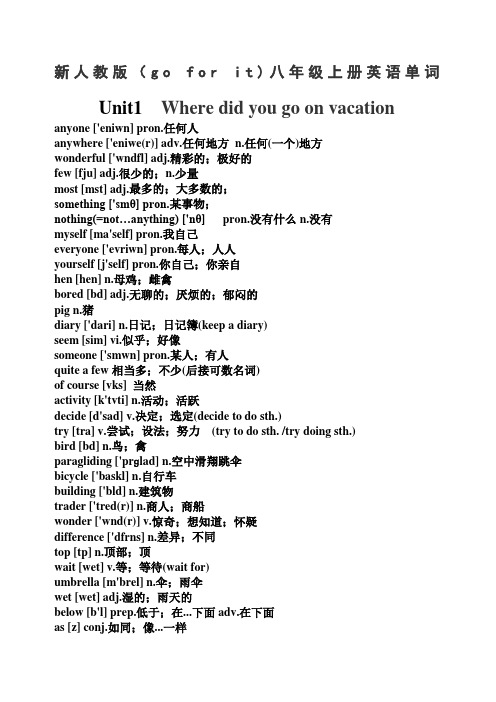
新人教版(g o f o r i t)八年级上册英语单词Unit1 Where did you go on vacation anyone ['eniwn] pron.任何人anywhere ['eniwe(r)] adv.任何地方n.任何(一个)地方wonderful ['wndfl] adj.精彩的;极好的few [fju] adj.很少的;n.少量most [mst] adj.最多的;大多数的;something ['smθ] pron.某事物;nothing(=not…anything)['nθ] pron.没有什么n.没有myself [ma'self] pron.我自己everyone ['evriwn] pron.每人;人人yourself [j'self] pron.你自己;你亲自hen [hen] n.母鸡;雌禽bored [bd] adj.无聊的;厌烦的;郁闷的pig n.猪diary ['dari] n.日记;日记簿(keep a diary)seem [sim] vi.似乎;好像someone ['smwn] pron.某人;有人quite a few相当多;不少(后接可数名词)of course [vks] 当然activity [k'tvti] n.活动;活跃decide [d'sad] v.决定;选定(decide to do sth.)try [tra] v.尝试;设法;努力(try to do sth. /try doing sth.)bird [bd] n.鸟;禽paragliding ['prɡlad] n.空中滑翔跳伞bicycle ['baskl] n.自行车building ['bld] n.建筑物trader ['tred(r)] n.商人;商船wonder ['wnd(r)] v.惊奇;想知道;怀疑difference ['dfrns] n.差异;不同top [tp] n.顶部;顶wait [wet] v.等;等待(wait for)umbrella [m'brel] n.伞;雨伞wet [wet] adj.湿的;雨天的below [b'l] prep.低于;在...下面adv.在下面as [z] conj.如同;像...一样enough ['nf] adj.足够的adv.足够地;充分地duck [dk] n.鸭肉;鸭hungry(反full) ['hɡri] adj.饥饿的;渴望的feel like(doing sth.)想要dislike [ds'lak] v.不喜欢;厌恶n.不喜爱;厌恶;反感because of因为;由于have a good time=enjoy oneself=have fun(doing sth.)玩得痛快Unit2 How often do you exercise housework ['haswk] n.家务劳动hardly ['hɑdli] adv.几乎不;简直不;刚刚ever ['ev(r)] adv.曾经;在任何时候once [wns] adv.一次;曾经twice [twas] adv.两倍;两次Internet ['ntnet] n.因特网program ['prɡrm] n.节目;程序;课程;节目单full [fl] adj.满的;充满的;完全的swing [sw] n.摇摆;秋千v.摇摆;旋转maybe ['mebi] adv.或许;也许;可能swing dance摇摆舞least [list] adj.最小的;最少的at least至少hardly ever很少;几乎从不;难得junk n.垃圾;废旧杂物coffee ['kfi] n.咖啡;咖啡色health [helθ] n.健康;人的身体或精神状态result [r'zlt] .结果;后果percent [p'sent] adj.百分之...的online [n'lan] adj.在线的adv.在线地television ['telvn] n.电视机;电视节目although [l'e] conj.虽然;尽管;然而;可是through [θru] prep.穿过;凭借;一直到body ['bdi] n.身体mind [mand] .头脑;想法;意见;心思such [st] adj.这样的;如此的together [t'ɡee(r)] adv.共同;一起die [da] v.死;枯竭;消失writer ['rat(r)] n.作者;作家dentist ['dentst] n.牙科医生magazine ['mɡzin] n.杂志however [ha'ev(r)] adv.然而;无论如何;不管多么than [en] conj.比almost ['lmst] adv.几乎;差不多none [nn] pron.没有人;没有任何东西,毫无less [les] adj.更少的;较少的point [pnt] n.看法;要点;重点;小数点;目标;分数such as例如;诸如junk food n.垃圾食品;无营养食品more than超过;多于;不仅仅;非常less than不到;少于Unit3 I'm more outgoing than my sister. outgoing ['atɡ] adj.外向的better ['bet(r)] adj.更好的;较好的adv.更好地loudly ['ladli] adv.大声地;高声地;花俏地quietly ['kwatli] adv.安静地;悄悄地;平静地hard-working [hɑd'wk] adj.勤勉的;努力工作的competition [kmp'tn] n.竞争;比赛fantastic [fn'tstk] adj.极好的;了不起的which adj.哪一个;哪一些pron.哪一个;哪些clearly ['klli] adv.清楚地;显然地win [wn] v.赢;赢得;获胜;获得n.胜利though conj.虽然;尽管;adv.不过care about关心talented ['tlntd] adj.有才能的;有天赋的truly ['truli] adv.真实地;真诚地;正确地care [ke(r)] v.关心;担忧;照顾;在乎serious ['sris] adj.严肃的;严重的;庄重的mirror ['mr(r)] n.镜子;反映necessary ['nessri] adj.必要的;必然的both [bθ] adj.两者都pron.两者should [d] aux.应该;可能;应当;将要touch [tt] vt.触摸;感动reach [rit] v.到达;伸出;达成;取得联系;延伸;(伸手)去够heart [hɑt] n.心脏;内心fact [fkt] n.事实;真相;实际break [brek] v.打碎;折断;违背;解决;中断laugh [lɑf] v.发笑;笑;嘲笑n.笑声;笑;笑料similar ['sml(r)] adj.类似的share [e(r)] vt.分享,共享;分配;共有loud [lad] adj.大声的;adv.大声地;响亮地primary ['pramri] adj.最初的,最早的be different from和...不同information [nf'men] n.信息;情报;资料;通知as long as只要bring out拿出;推出the same as与...同样的in fact事实上;实际上;确切地说be similar to类似于;与...相似Unit4 What's the best movie theater theater ['θt] n.剧场;电影院;戏院comfortable ['kmftbl] adj.舒适的;充裕的seat [sit] n.座位;screen [skrin] n.屏幕;银幕close [kls] v.关;合拢;不开放;停业worst [wst] adj.最坏的;最差的cheaply ['tipli] adv.廉价地;粗俗地song [s] n.歌曲;歌唱choose [tuz] v.选择;决定carefully ['kefli] adv.小心地,认真地reporter [r'pt(r)] n.记者fresh [fre] adj.新鲜的;清新的comfortably ['kmftbli] adv.舒服地;容易地;充裕地worse [ws] adj.更坏的;更差的service ['svs] n.服务pretty ['prti] adv.相当地adj.漂亮的menu ['menju] n.菜单act [kt] v.行动;表演meal [mil] n.一餐;膳食so far到目前为止;迄今为止no problem没什么;不客气creative [kri'etv] adj.创造的,创造性的;performer [p'fm(r)] n.表演者;执行者talent ['tlnt] n.天赋;才能,才艺;common ['kmn] adj.常见的;共同的;普通的magician [m'dn] n.魔术师;术士beautifully ['bjutfli] adv.美丽地;完美地;role [rl] n.作用;角色winner ['wn(r)] n.获胜者prize [praz] n.奖品;奖金everybody ['evribdi] pron.每人;人人example [ɡ'zɑmpl] n.例子;榜样poor [p(r)] adj.可怜的;贫穷的seriously ['srisli] 严重地,严肃地give [ɡv] v.给;赠予;送crowded ['kradd] adj.拥挤的have…in common有相同特征all kinds of各种各样;各种类型be up to是…….的职责;由…….决定play a role发挥作用;有影响makeup编造for example例如take…seriously认真对待Unit5 Do you want to watch a game show sitcom ['stkm] n.情景喜剧(= situation comedy)news [njuz] n.新闻;消息soap [sp] n.肥皂;肥皂剧educational [edu'kenl] adj.教育的;有教育意义的plan [pln] n.计划;方法v.打算;计划hope [hp] .希望;期望;盼望n.希望discussion [d'skn] n.讨论;谈论stand [stnd] v.站立;忍受happen ['hpn] vi.发生;碰巧;出现;偶遇may [me] aux.可以,能够;可能,也许expect [k'spekt] v.预期;期待;盼望joke [dk] n.笑话;玩笑v.说笑话;开玩笑comedy ['kmdi] n.喜剧;滑稽;幽默事件find out查明、弄清meaningless ['minls] adj.无意义的;不重要的action ['kn] n.行为;活动cartoon [kɑ'tun] n.卡通;漫画culture ['klt(r)] n.栽培;文化;教养famous ['fems] adj.着名的;有名的appear ['p(r)] vi.出现;出版;显得become [b'km] v.变成;成为rich [rt] adj.富有的;富饶的;丰富的successful [sk'sesfl] adj.成功的;圆满的might [mat] aux.可能;也许;may的过去式main [men] adj.主要的;最重要的reason ['rizn] n.原因;理由film [flm] n.电影unlucky [n'lki] adj.倒霉的;不幸的;不吉利的lose [luz] vt.丢失;失败vi.失败ready ['redi] adj.准备好的;乐意的character ['krkt(r)] n.个性;品质;人物;simple ['smpl] adj.简单的;朴素的;单纯的;笨的army ['ɑmi] n.军队;陆军;一大批action movie动作片be ready to愿意迅速做某事dress up装扮;乔装打扮take sb.’s place代替;替换do a good job工作干得好;做得好Unit6 I'm going to study computer science. doctor ['dkt(r)] 医生engineer [end'nr] 工程师violinist [va'lnst] 小提琴手pilot ['palt] 飞行员pianist ['pnst] 钢琴家scientist ['santst] 科学家college ['kɑld] 大学education [edu'ken] 教育medicine ['medsn] 药,医学university [jun'vrsti] 大学,高等学府article ['ɑrtkl] 文章,论文send [send] 邮寄,发送grow up长大成长computer programmer计算机管理员be sure about确信make sure确保resolution [rez'lun] 决心,决定foreign ['frn] 外国的able [ebl] 能够discuss [dsks] 讨论,商量promise [prɑms] 承诺,诺言beginning [bɡn] 开头,开端improve [mpruv] 改进,改善physical ['fzkl] 身体的self-improvement [selfmp'ruvmnt] 自我改进,自我提高hobby ['hɑbi] 业余爱好own [on] 自己的,本人的,拥有personal ['prsnl] 个人的,私人的relationship [r'lenp] 关系write down写下have to do with关于;与……有关系take up学着做;开始做agree with同意be able to能够做某事Unit 7 Will people have robots paper ['pepr] 纸pollution [p'lun] 污染;污染物prediction [pr'dkn] 预测future ['fjutr] 未来pollute [p'lut] 污染environment [n'varnmnt] 环境planet ['plnt] 行星earth [rθ] n.地球;泥土plant [plnt] 种植,植物part [pɑrt] 参加,部分peace [pis] 和平sky [ska] 天空play apart参与astronaut ['strnt] 宇航员apartment ['pɑrtmnt] 公寓房间rocket ['rɑkt] 火箭;space [spes] .空间;太空even ['ivn] 甚至;愈加human ['hjumn] 人的;n.人;人类servant ['srvnt] 仆人dangerous ['dendrs] 危险的already [l'redi] 已经factory ['fktri] 工厂believe [b'liv] 相信disagree [ds'ɡri] 不同意shape [ep] 形状fall [fl] 倒塌;跌倒possible ['pɑsbl] 可能的probably ['prɑbbli] 大概;或许;很可能holiday ['hɑlde] 假日word [wrd] 单词;space station太空站over and over again多次;反复地hundreds of许多;大量;成百上千fall down突然倒下;跌倒;倒塌look for寻找;寻求Unit 8 How do you make a banana milk shake blender ['blendr] 搅拌器;果汁机peel [pil] vt.剥落;削皮pour [pr] pour [pr] 倒;倾倒yogurt ['joɡrt] 酸奶;honey ['hni] 蜂蜜watermelon ['wtrmeln] 西瓜spoon [spun] 勺,调羹add [d] 增加finally ['fanli] 最后,最终salt [slt] 盐sugar ['ɡr] 糖cheese [tiz] 干酪,奶酪popcorn ['pɑpkrn] 爆米花corn [krn] 玉米,谷物machine [m'in] 机器sandwich ['snwt] 三明治butter ['btr] 黄油,奶油turkey ['trki] 火鸡lettuce ['lets] 莴苣,生菜piece [pis] 件;篇;片;块;traditional [tr'dnl] 传统的traveler ['trvl] 旅行者England ['ɡlnd] 英格兰;英国celebrate ['selbret] 庆祝;庆贺pepper ['pepr] 胡椒粉;辣椒oven ['vn] 烤箱;烤炉cover ['kvr] 遮盖,盖子,gravy ['ɡrevi] 肉汁;肉汤serve [srv] 接待,服务temperature ['temprtr] 温度,气候Unit 9 Can you come to my party prepare [pr'per] v.预备;准备exam [ɡ'zm] 考试available ['velbl] 可得到的;有空的;hang [h] 悬挂;(使)低垂until [n'tl] 直到...的时候;直到…为止catch [kt] 赶上;抓住;捕捉invite [n'vat] 邀请accept [k'sept] 接受;refuse [r'fjuz] 拒绝invitation [nv'ten] 邀请;邀请函reply [r'pla] 回答,回复forward ['frwrd] 转交;发送,向前的delete [d'lit] 删除preparation [prep'ren] 准备,准备工作opening ['opn] 开幕式,落成典礼guest [ɡest] 客人concert ['kɑnsrt] 音乐会headmaster [hed'mstr] 校长event ['vent] 大事,公开活动calendar ['klndr] 日历,日程表Unit10 If you go to the party,you 'll have a great time! video ['vdio] 录像,录像带organize ['rɡnaz] 组织,筹备chocolate ['tɑklt] 巧克力upset [p'set] 难过,失望advice [d'vas] 劝告,建议travel ['trvl] 旅行agent ['ednt] 代理人,经纪人expert ['eksprt] 专家,能手teenager ['tined] 青少年normal ['nrml] 正常的unless [n'les] 除非,如果不certainly ['srtnli] 当然,肯定wallet ['wɑlt] 皮夹,钱包worried ['wrid] 担心的,烦恼的angry ['ɡri] 生气的,发怒的careless ['kerls] 粗心的,不小心的understanding [ndr'stnd] 善解人意的,体谅人的trust [trst] 相信,信任mistake [m'stek] 错误,失误careful ['kerfl] 小心的,细致的advise [d'vaz] v劝告,建议solve [sɑlv] 解决;解答experience [k'sprins] 信任,经历halfway [hf'we] 中途的adv.半路地else [els] 别的,其他的。
unit10 Where did you go on vacation Period 2 课件

- Where did you go ? - I went to … -Did you go to …?
-Yes, I did./No, I didn’t. -How were the Chinese people? - They were friendly.
Tian’an Men Square
16
- They were friendly...
12
Pairwork : Beaches : fantastic
Weather : hot and humid
People : friendly/unfriendly
黄山
西双版纳
hot and humid
Where did he/she/they go on vacation?
A: How was the food? B: It was awful.
9
A: What did they do?
B: They visited the museum
A: How was the museum?
B: It was boring. A: where did he go on vacation? B: He went to the beach.
-Where did you go ? - I went to … - Did you go to …? -Yes, I did./No, I didn’t. -How were the New York City American people? - They were friendly.
Pair work: Where did they go on vacation?
went to the beach went to the museuwment to the mountains
八年级上册词汇表汉译英
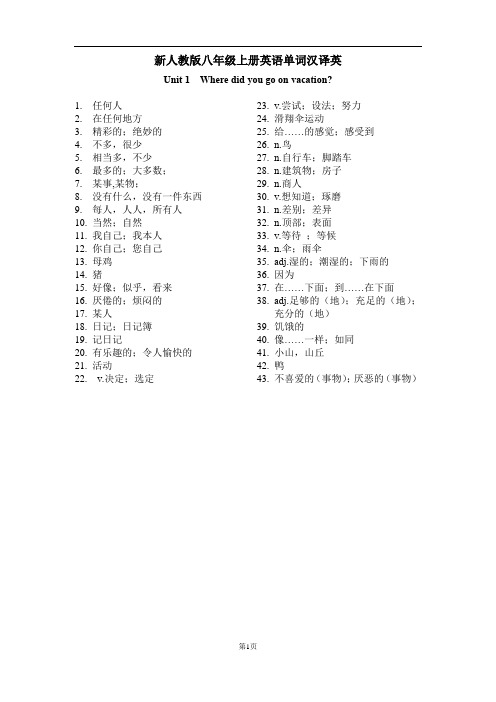
新人教版八年级上册英语单词汉译英Unit 1 Where did you go on vacation?1.任何人2.在任何地方3.精彩的;绝妙的4.不多,很少5.相当多,不少6.最多的;大多数;7.某事,某物;8.没有什么,没有一件东西9.每人,人人,所有人10.当然;自然11.我自己;我本人12.你自己;您自己13.母鸡14.猪15.好像;似乎,看来16.厌倦的;烦闷的17.某人18.日记;日记簿19.记日记20.有乐趣的;令人愉快的21.活动22.v.决定;选定23.v.尝试;设法;努力24.滑翔伞运动25.给……的感觉;感受到26.n.鸟27.n.自行车;脚踏车28.n.建筑物;房子29.n.商人30.v.想知道;琢磨31.n.差别;差异32.n.顶部;表面33.v.等待;等候34.n.伞;雨伞35.adj.湿的;潮湿的;下雨的36.因为37.在……下面;到……在下面38.adj.足够的(地);充足的(地);充分的(地)39.饥饿的40.像……一样;如同41.小山,山丘42.鸭43.不喜爱的(事物);厌恶的(事物)Unit2 How often do you exercise?1.n.家务劳动;家务事2.adv.几乎不;几乎没有3.adv.在任何时候;从来;.曾经;4.几乎从不5.adv.一次;曾经6.adv.两倍;两次7.n.因特网;互联网8.n.节目;9.adj.忙的;满的;充满的10.n.摆动;秋千v.摇摆;摆动11.摇摆舞12.adv.大概;或许;可能13.最小;最少;最小的;最少的14.至少;不少于;起码15.n.无用的东西,无价值的东西16.垃圾食品17.n.咖啡18.n.健康;人的身体或精神状态19.结果;后果20.n.百分之...21.adj.在线的;联网的22.n.电视机;电视节目23.conj.虽然;尽管;即使24.prep.以;穿过;凭借;25.n.身体26.n .头脑;心智27.adj.这样的;那样的;类似的28.adv.共同;在一起29.v.消失;灭亡;死亡30.n.作者;作家31.n.牙科医生32.n.杂志;期刊33.adv.然而;不过34.比35.adv.几乎;差不多36.pron.没有一个;毫无37.adj.更少的;较少的;较少;较小38.n.得分,点v.指,指向Unit3 I'm more outgoing than my sister.1.adj.爱交际的;有好的;外向的2.两个都;两个3.adj.更好的;较好的adv.更好地;较好地4.adv.喧闹地;大声地;响亮地5.adv.安静地;轻声地;轻柔地6.adj.工作努力的;辛勤的7.n.竞争;比赛;竞赛8.adj.极好的;了不起的9.哪一个;哪一些10.adv.清楚地;清晰地;明白地11.v.赢;赢得;获胜;12.conj.虽然;尽管;不过;adv.不过;可是;然而13.adj.有才能的;有才干的14.adv.真正;确实15.v.关心;担忧;在意16.关心;在意17.笑;发笑;笑声18.adj.严肃的;稳重的19.n.镜子;20.小孩;年轻人21.只要;既然22.adj.必要的;必需的23.与……不同;与……有差异24.使显现;使表现出25.成绩等级,评分等级26.应该;应当;可以27.和……相同;与……一致28.谚语,格言,警句29.伸手;到达;抵达30.手31.vt.触摸;感动32.n.心脏;内心33.n.事实;现实34.确切地说;事实上;实际上35.破;裂;碎;损坏36.手臂,上肢37.分享;共享;共用;分摊38.adj.大声的;响亮的;39.相像的;类似的40.与……相像的,类似的41.adj.最初的,最早的42.小学43.n.信息;消息Unit4 What's the best movie theater?1.n.剧场;戏院2.adj.舒适的;使人舒服的3.n.座位;坐处4.n.屏幕;银幕5.v.接近6.n. 票,入场券7.adj.最坏的;最差的;最糟的8.adv.便宜地,低廉地9.n.歌曲;歌10.音乐节目主持人11.v.选择;挑选12.adv.小心地,细致地;谨慎地13.n.记者14.到目前为止,迄今为止15.adj.新鲜的;清新的16.adv.舒服地;舒适地17.adj.更坏的;更差的;更糟的18.n.接待;服务19.adv.相当;十分;很adj.漂亮的20.n.菜单21.扮演;表演者22.n.一餐所吃的食物,早(或午、晚)餐23.有创造力的,创造性的24.表演者,演员25.n.天资;天赋;26.有相同特征;(想法、兴趣等方面)相同27.n.魔术师;28.adv.美好地;漂亮地29.是……的职责,由……决定30.n.作用;职能;角色31.发挥作用;有影响32.n.获胜者;优胜者33.n.奖;奖品;奖金34.pron.每人;人人;所有人35.编造(故事,谎言)36.n.实例;范例37.例如38.adj.清贫的;贫穷的39.严重地,严肃地;认真地40.认真对待41.v.给;提供42.adj.拥挤的;人多的;挤满的Unit5 Do you want to watch a game show?1.n.情景喜剧(= situation comedy)2.n.新闻节目;新闻3.n.肥皂剧4.介意;对(某事)烦恼5.忍受;站立6.adj.教育的;有教育意义的7.打算;计划8.希望;9.查明;弄清10.n.讨论;商量11.v.站立;忍受12.vi.发生;出现13.v.预期;期待;14.n.笑话;玩笑15.n.喜剧;喜剧片16.查明、弄清17.adj.毫无意义的;意思不明确的18.n.行动19.动作影片20.n.卡通片;动画片21.n.文明;文化;22.adj.著名的;出名的23.vi.出现;24.v.变成;开始变得25.adj.富有的26.adj.获得成功的;有成就的27.可能;可以28.adj.主要的;最重要的29.n.原因;理由30.adj. 普通的,常见的31.n.电影32.adj.不幸的;不吉利的33.vt.丢失;失去34.女朋友35.adj.准备好的;愿意的36.准备好做某事;愿意做某事37.n.角色;人物;38.adj.简单的;易做的39.装扮;乔装打扮40.代替;替换41.陆军;陆军部队42.工作干得好;做得好Unit6 I'm going to study computer science.1.长大;成熟;成长2.计算机程序设计员;编程人员3.n 厨师,v.烹饪,煮4.医生5.工程师6.小提琴手7.驾驶员;司机8.飞行员9.钢琴家10.科学家11.确信;对……有把握12.确保;查明13.大学;学院;高等专科学校14.教育15.药,医学16.大学,高等学府17.文章,论文18.邮寄,发送19.决心,决定20.队,组21.成为足球队的一员22.外国的23.能够24.能够做某事25.承诺,诺言;许诺;承诺26.开头,开端27.在……开始28.改进,改善29.写下;记录下30.身体的31.他们自己32.关于,与……有关系33.自我改进,自我提高34.学着做;开始做35.业余爱好36.用颜料画;在……上刷油漆37.每周的(地)38.学校作业,功课39.v. 表示疑问,怀疑;提问;质询40.意义,意思41.讨论,商量42.自己的,本人的,43.个人的,私人的44.关系;联系Unit 7 Will people have robots?1.纸;纸张2.污染;污染物3.预测,预言4.未来5.污染6.环境7.行星8.n.地球;世界9.种植,植物10.部分11.参与;发挥作用12.和平13.海;海洋14.建筑;建造15.宇航员;航天员16.公寓套房17.火箭;18.空间;太空19.太空站;宇宙空间站20.人的;n.人;21.仆人22.有危险的;不安全的23.已经;早已24.工厂25.反复地;多次26.日本27.相信;认为有可能28.不同意;持不同意见;有分歧29.甚至;连;愈加30.同意;赞成;应允31.许多;大量32.形状;外形33.倒塌;跌倒;掉落;秋天34.突然倒下;跌倒;倒塌35.在……里面36.可能的;可能存在或发生的37.不可能存在或发生的,不可能的38.一方39.大概;很可能40.在……期间41.假日;假期42.单词;词Unit 8 How do you make a banana milk shake?1.摇动,抖动2.奶昔3.食物搅拌器;4.接通;打开5.vt.剥皮;去皮6.倒出;倾倒7.酸奶;8.蜂蜜9.西瓜10.勺,调羹11.锅12.增加;添加13.最后,最终14.食盐15.食糖16.干酪,奶酪17.爆米花18.玉米,谷物19.机器;机械装置20.掘(地),凿(洞),挖(土)21.洞;孔;坑22.三明治;夹心面包片23.黄油,奶油24.火鸡25.莴苣,生菜26.段;片;块;27.感恩节28.传统的;惯例的29.秋天;秋季30.漂泊者;旅行者;游客31.英格兰;32.庆祝;庆贺33.(使)混合,融合;混合配料34.胡椒粉;柿子椒35.使)充满,装满36.烤箱;烤炉37.盘子;碟子38.遮盖,覆盖;覆盖物;盖子,39.肉汁;40.v.接待,服务;提供41.温度,气温;体温Unit 9 Can you come to my party?1.使做好准备;把……准备好2.为……做准备3.考试4.去看医生5.流行性感冒,流感6.可获得的;有空的;7.其他时间,别的时间8.到……时;直到……为止9.悬挂;垂下10.闲逛,常去某处11.及时赶上;抓住;接住12.邀请13.接受;14.拒绝15.前天16.后天17.工作日18.照顾;照料19.n.邀请;请柬20.拒绝21.回答,回复22.转寄;发送,向前;前进23.删除24.打印;印刷25.(令人)悲哀的,(令人)难过的26.再见27.去旅行28.高兴,愿意29.分担工作;解决难题30.准备,准备工作31.胶水32.没有,不(做某事)33.惊奇的,感觉意外的34.盼望,期待35.接到(某人的)信,电话等36.乔迁聚会37.开幕式,落成典礼38.音乐会;演奏会39.校长40.大事,公开活动;比赛项目41.客人,宾客42.日历,日程表43.白天;日间Unit10 If you go to the party, you 'll have a great time!1.会议,集会,会面2.录像,录像带3.组织,筹备4.炸土豆片,炸薯条5.巧克力6.难过,失望;沮丧7.出租汽车,的士8.劝告,建议9.旅行,游历10.代理人,经纪人11.专家12.保守秘密13.青少年14.正常的;一般的15.除非,如果不16.无疑;当然,肯定;行17.钱包18.英里19.生气的,发怒的20.善解人意的,体谅人的21.粗心的,不小心的22.错误,失误23.他自己24.小心的,细致的;精心的;慎重的25.劝告,建议26.解决;解答27.步骤,步28.相信,信任29.经验;经历30.分成两半31.在中途的;部分地做(或达到)32.别的,其他的。
七年级英语unit10 where did you go on vacation课件

2a
Listen. Match the person with the place.
People
Places
1. c Nancy a. the beach 2. a Kevin b. home
3. b Julie
c. New York City
2b
Listen again. For each question check (√) “Yes, I did.” or “ No, I didn’t.”
Where did they go on vacation ?
They went to summer camp .
Where did Tina/Brad/…go on vacation?
Xiang Hua
Tina
Sally
Brad Tom
mountains
Where did Tina go on vacation? She went to the mountains?
Did he go to summer camp on vacation? Yes, he did.
Tom
summer camp
Where did Xiang Hua go on vacation? He went to New York City.
Did he go to summer camp on vacation? No, he didn’t.
Read:
Where did he go on vacation ? He went to New York City .
Where did she go on vacation ?
She stayed at home and watchedo on vacation ? They went to the beach . Where did they go on vacation ? Where did they go on vacation ? Where did they go on vacation ? They went to the mountains . They visited their friend. They visited museums .
人教版七年级英语《Unit.10.Where.did.you.go.on.vacation》教案

Unit 10 Where did you go onvacation?Topic: Holidays and vacationsFunctions: Talk about past eventsStructures:Past tense of regular and irregular verbswas / wereHow questionsTarget language: Where did you go on vacation?We went to New York City.Did you go to Central Park?Yes, I did.How was the weather?It was humid.Teaching StepsPeriod 1Good morning everyone! We have finished Unit 9. Today we are going to learn a new unit—Unit 10.Step 1: Lead inAsk and answera. Can you tell me what the title of Unit 10 is? Yes, it’s Where did you go on vacation? What do you think the unit is about?b. Yes. In this unit we are going to talk about past events.Step 2: Section A 1aIn Unit 9, we talked about the recent past activities and in this unit, we are going to continue talking about the past events.First, please open your books at Page 59 and look at activity 1a.1. Look and findLet’s look at activity 1a and find what the phrases mean.2. MatchYou know what the phrases mean. Please match them with the pictures.3. Check the answersHave you finished? Let’s check the answers one by one.Answers: 1. e 2. b 3. d 4. c 5. a 6. f 7. g4. Reada. Please read the phr ases after me. Stayed at home …b. Let’s read them together.c. Would you please read them one by one?Step 3: Section A 1b1. Listen and numberListen to the tape. And number the people from 1 to 5 in the picture. 2. Check the answersLet’s check the answers.Answers: 1. went to the mountains2. visited my uncle3. stayed at home4. went to New York City5. went to summer camp3. Reada. I would like you to read the conversations together.b. Would you please read them by yourselves three times?c. This time I would like you to read them twice with your partner.d. Who would like to read in class?Step 4: Section A 1cPairwork1. ReadWould you please read the conversation in 1c with your partner?2. Practicea. Would you please make conversations with your partner to talk about where the people went on vacation in activity 1a?b. Who would like to have a try in class?Step 5: Section A 2a1. ListenNow class, let’s move to activity 2a now. Please listen to the tape for the first time.2. MatchWhere did Nancy, Kevin and Julie go on vacation? Please match the person with the place when you listen to it for the second time.3. Check the answersHave you finished? Please check your answer with your partner and see whether your answers are the same. Let’s check them together.Answers: 1. c 2. a 3. bStep 6: Section A 2b1. Listen and checka. Listen to the conversation for the first time.b. Please check (√) “Yes, I did.” or “No, I didn’t.” for each question as you hear them talk.2. Check the answersHave you finished? Let’s check them.Answers: go to Central Park? Yes, I did.play volleyball? No, I didn’t.swim? Yes, I did.go to the movies? No, I didn’t.study for exams? Yes, I did.3. Reada. Let’s read the conversations together.b. I would like you to read them by yourselves.c. Who would like to have a try to read them in class?Step 7: Section A 2cGroupworka. Now class, let’s move to activity 2c.It’s a groupwork. Would you please role play conversations between Nancy, Kevin, and Julie?b. Who would like to have a try in class?c. Well done. Please pay attention to the past forms of the verbs in the phrases.Step 8: Grammar Focus1. ReadRead the sentences in the grammar box.2. Point out the notesSimple past tense Regular verbs Irregular verbsStep 9: SummarizeLet’s summarize what we learnt in this period.Step 10: Homework1. Copy the words in activity 1a and the sentences in the grammar box.2. Practice activity 2a and 2b.Period 2Step 1: Lead inWhat did we learn in Period 1? Who can tell us? Yes. We got to know how to talk about past events. Besides them, we learnt some regular verbs and some irregular verbs. Do you still remember how to say them? OK. Let’s review them first.Step 2: Revision1. Ask and answera. Would you please translate my Chinese into English? 拜访我的舅舅、参观博物馆……b. Please practice in pairs. Student A says in Chinese and student B translates it into English.2. DictationPlease take out your dictation exercise books and let’s have a dictation.Step 3: Section A 3a1. FillNow, let’s move to a new part of lessons. Would you please look at activity 3a on Page 61? Fill in the blanks with “was” or “were” in the c onversation.2. Check the answersI think all of you did well.Answer: 1. was 2. was 3. were 4. were 5. was 6. was 7. were 8. were3. Reada. Read the conversation with your partner.b. I would like you to read it together.c. Would you like to read it in class? Please have a try.4. Explainpretty good fantastic unfriendlyStep 4: Section A 3bPairworka. Just now, we learnt how to ask about the vacation. Now, I would like you to do a pairwork to ask and answer questions about the people’s vacations in 3b. Please follow the example in 3a.b. Who would like to have a try in class?Step 5: Section A 4Game—Vacation albumJust now, we talked about some people’s vacations. How about your vacations? Please make a photo album of vacations you enjoyed. Show the album to your classmates and talk about your vacations.Step 6: SummarizeLet’s summarize what we learnt in this period.Step 7: HomeworkCopy and try to recite the conversation in 3a.Period 3Step 1: Lead inGood morning, boys and girls. Shall we continue our lessons? Could you please tell me what we learnt in Section A? Yes. We learnt to talk about the weekend.Step 2: RevisionReviewa. I will show you some pictures and some information and please make conversations.b. Let’s have a dictation.Step 3: Section B 1a1. Looka. In Section A, we talked about the vacations with some description words. In Section B, we are going to learn more description words.b. Open your books at Page 62. Would you please look at activity 1a?c. Look at the words and the pictures.2. MatchPlease match the words with the pictures.3. Check the answersHave you finished, everyone? Let’s check them together.Answers: 1. f 2. a 3. d 4. e 5. b 6. cStep 4: Section B 1b1. WriteLet’s move to activity 1b. Do you think the words in 1a are happy words or unhappy words? Write happy words on the left and write unhappy words on the right.2. Check the answersCheck the answers with your friends.Answers:Happy words: delicious, cheap, not crowdedUnhappy words: awful, expensive, crowdedStep 5: Section B 2a1. Listen and answera. Let’s move to activity 2a now. It is a listening exercise. For the first time, I would like you to listen only.b. Now, for the second time, please listen to it again and answer the questions in activity 2a.2. Check the answersI think most of you have finished it. Let’s check them together.Answers: 1. She went to Tokyo.2. Yes, she did.Step 6: Section B 2b1. ListenListen to the conversation for the first time.2. Listen and filla. Listen to the conversation again and fill in the chart.b. Listen to the conversation again and check them by yourselves.3. Check the answersLet’s check the answers together.Answers: vacation: greatmuseums: interesting, crowdedstores: expensivepeople: friendlyfood: delicious4. Read the tapescripta. Let’s read the tapescript together.b. Would you please read the tapescript in pairs?c. Please translate the conversation into Chinese in pairs.d. Who would like to read in class?Step 7: Section B 2cPairworkRole play. Student A is Vera’s friend. Student B is Vera. Talk about Vera’s vacation. Use the information in the chart above. Student A begins questions with these words: Where did …? What did …? Did you …? How was …? How were …?Step 8: SummarizeLet’s summarize what we learnt in this period.Step 9: HomeworkPractice activity 2a and 2b in Section B.Period 4Step 1: Lead inWe have finished the most part of Unit 10. And in this period, we will continue to finish Section B. But before that, I would like you to review what we learnt before.Step 2: Revisions1. Make a speechCan you make a speech according to the chart to tell us your vacation?2. DictationLet’s have a dictation.Step 3: Section B 3a1. Reada. Let’s go into activity 3a on Page 63. There is a diary from Bob.b. Please read it by yourselves. If you have any questions, please ask me.c. I would like you to read it together.2. Circle and underlinePlease circle the good things about his vacation and underline the bad things.3. Check the answersI think most of you have finished. Please check your answers with your partner.Answers:Circled items: the weather (great)the beach (beautiful)playing in the water (fun)helping the little boy find his father (happy)playing tennis (really fun)eating Sichuan food (delicious)Underlined items: shops were too crowded (didn’t really enjoy them)museum (kind of boring)no money for taxi / walking back to hotel (tired)4. ExplainLet me explain some key words and phrases to you.all day have a fun doing sth. be crowded kind of find sb. doing sth. be lost help sb do sth. make sb. do sth. walk back to decide to do sth. all morning for dinnerStep 4: Section B 3b1. WriteImagine you are an American student on vacation in Beijing. Would you please write a travel diary according to the pictures given below?2. Reada. Please read your diary to your partner.b. Who would like to have a try to read it in class?Step 5: Section B 4GroupworkImagine you are all foreigners on vacation in China. You meet each other at the airport on your way home. Talk about what you did on your vacation.Step 6: SummarizeLet’s summarize what we did in this period.Step 7: HomeworkTry to recite the article in 3a.Period 5Step 1: Lead inWe have spent four periods on Unit 10. This is the last period of Unit 10. In this period, we will do some exercises and make sure you learn this unit well.Step 2: Self-check-11. Check the words and the phrases you knowOpen your books and look at Self-check-1. If you know the words and the phrases well, please check them.2. ReadI would like all of you to read the words and the phrases together.Step 3: Self-check-21. Do you have any other words you don’t know? Please write them in your exercise books.2. Please ask your friends for help.3. Looking up the dictionary is also a good way to study English. I hope you can get more from dictionaries.Step 4: Self-check-31. CompleteLet’s move to Self-check-3 now. First, I would like you to complete the form below.2. Make a surveya. Make questions about vacations. Write some questions about vacations.b. I would like you to ask your partner the questions you write and write down their answers.c. Discuss the best place for a vacation with your classmates.3. WriteWrite a report on student s’ vacations.Step 5: SummarizeLet’s summarize what we did in this period.Step 6: Homework1. Do the exercises on the Students’ Book and the textbook.2. Review Unit 10.3. Watch the pictures in Just for fun on Page 64.这份文件是人教版七年级英语《Unit 10 Where did you go on vacation?》的教案,主要涵盖了五个教学周期(Period)的内容,每个周期都详细规划了教学目标、教学活动、教学方法以及课后作业。
Unit10-Where-did-you-go-on-vacation英文说课稿
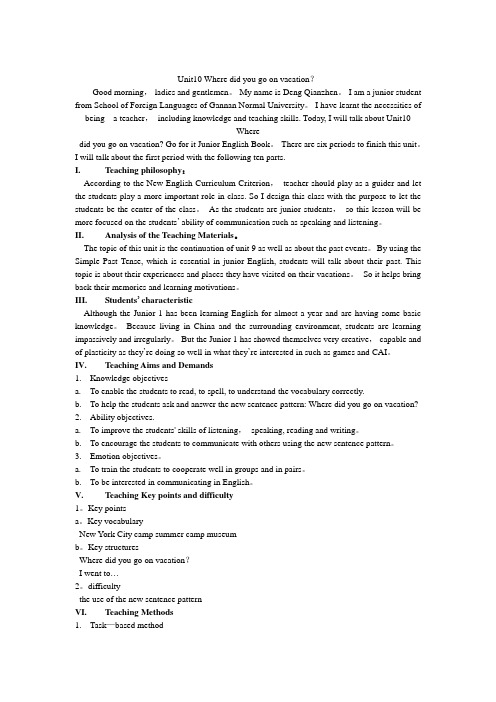
Unit10 Where did you go on vacation?Good morning,ladies and gentlemen。
My name is Deng Qianzhen。
I am a junior student from School of Foreign Languages of Gannan Normal University。
I have learnt the necessities of being a teacher,including knowledge and teaching skills. Today, I will talk about Unit10Wheredid you go on vacation? Go for it Junior English Book。
There are six periods to finish this unit。
I will talk about the first period with the following ten parts.I.Teaching philosophy:According to the New English Curriculum Criterion,teacher should play as a guider and let the students play a more important role in class. So I design this class with the purpose to let the students be the center of the class。
As the students are junior students,so this lesson will be more focused on the students’ ability of communication such as speaking and listening。
Unit10Wheredidyougoonvacation单元知识点
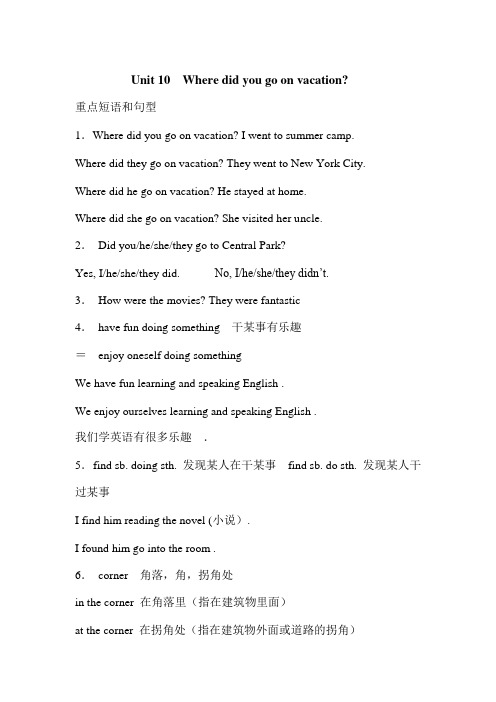
Unit 10 Where did you go on vacation?重点短语和句型1.Where did you go on vacation? I went to summer camp.Where did they go on vacation? They went to New York City.Where did he go on vacation? He stayed at home.Where did she go on vacation? She visited her uncle.2.Did you/he/she/they go to Central Park?Yes, I/he/she/they did. No, I/he/she/they didn’t.3.How were the movies? They were fantastic4.have fun doing something干某事有乐趣=enjoy oneself doing somethingWe have fun learning and speaking English .We enjoy ourselves learning and speaking English .我们学英语有很多乐趣.5.find sb. doing sth. 发现某人在干某事find sb. do sth. 发现某人干过某事I find him reading the novel (小说).I found him go into the room .6.corner角落,角,拐角处in the corner 在角落里(指在建筑物里面)at the corner 在拐角处(指在建筑物外面或道路的拐角)My bike is at the corner .7.be lost 迷路了=get lost , lost (adj.)The girl was lost in the big city .8.help sb. (to) do sth.=help sb for sth 协助某人干某事He always helps us learn English9. make sb. do sth. 让/使某人干某事let / have sb. do sth. do前不带toThe movie makes me relaxing.Let the boy do his homework alone.10. feel+ adj. 感到...I feel hungry / tired /happy / excited11. decide to do sth. 决定干某事They decided to go to Hainan on vacation。
【范文】Unit 10 Where did you go on vacation-(新目标七下英
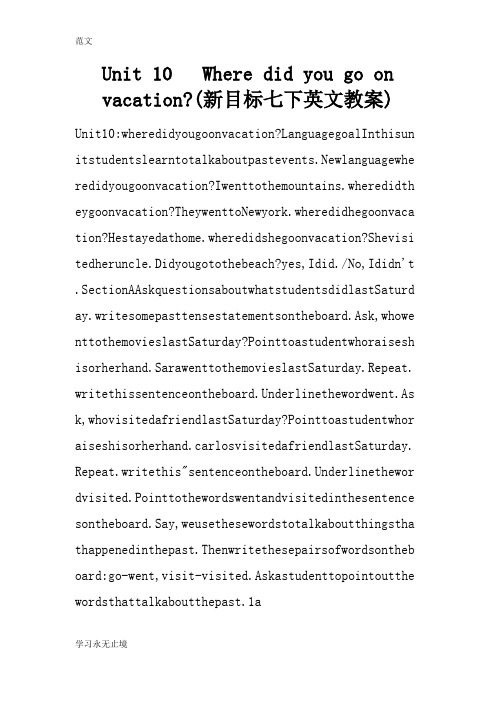
Unit 10 Where did you go onvacation?(新目标七下英文教案) Unit10:wheredidyougoonvacation?LanguagegoalInthisun itstudentslearntotalkaboutpastevents.Newlanguagewhe redidyougoonvacation?Iwenttothemountains.wheredidth eygoonvacation?TheywenttoNewyork.wheredidhegoonvaca tion?Hestayedathome.wheredidshegoonvacation?Shevisi tedheruncle.Didyougotothebeach?yes,Idid./No,Ididn't .SectionAAskquestionsaboutwhatstudentsdidlastSaturd ay.writesomepasttensestatementsontheboard.Ask,whowe nttothemovieslastSaturday?Pointtoastudentwhoraisesh isorherhand.SarawenttothemovieslastSaturday.Repeat. writethissentenceontheboard.Underlinethewordwent.As k,whovisitedafriendlastSaturday?Pointtoastudentwhor aiseshisorherhand.carlosvisitedafriendlastSaturday. Repeat.writethis"sentenceontheboard.Underlinethewor dvisited.Pointtothewordswentandvisitedinthesentence sontheboard.Say,weusethesewordstotalkaboutthingstha thappenedinthepast.Thenwritethesepairsofwordsontheb oard:go-went,visit-visited.Askastudenttopointoutthe wordsthattalkaboutthepast.1aThisactivityintroducesthekeyvocabulary.Focusattenti ononthepicture.Askstudentstotellwhattheysee.Say,Eac eacha ctivityandaskstudentstorepeat:wenttothemountains,we nttoNewyorkcity,wenttosummercamp,visitedmyuncle,sta yedathome,wenttothebeach,andvisitedmuseums.Pointout thenumberedlistofactivities.Sayeachoneagainandaskst udentstorepeat.Thenaskstudentstomatcheachphrasewith oneofthepictures.Say,writetheletterofeachpicturenex ttothenameoftheactivity.Pointoutthesampleanswer.che cktheanswers.1bThisactivitygivesstudentspracticeinunderstandingthe targetlanguageinspokenconversation.Pointtothepictur e.Askstudentstotellwhatthepersondidineachscene.Fore xample,TinawenttothemountainsorShewenttothemountain s.Playtherecordingthefirsttime.Studentsonlylisten.P laytherecordingasecondtime.Thistimesay,Therearethre econversations.Thepeopletalkaboutwhattheydidonvacat ion.Listentotherecordingandwritenumbersofthenamesin thewhiteboxesinthepicture.Pleasewriteonlyfivenumber s.Pointoutthesampleanswernexttothepictureshowingwenttothemountains.correcttheanswers.1cThisactivityprovidesguidedoralpracticeusingthetarge tlanguage.Pointouttheexampleconversation.Asktwostud entstoreadthedialoguetotheclass.Say,Nowworkwithapar tner.makeyourownconversationsaboutthepictures.Sayth edialogueinthepicturewithastudent.Doasecondexample, ifyouwish.Thenhavestudentsworkinpairs.Astheytalk,mo vearoundtheroommonitoringtheirwork.offerlanguageorp ronunciationsupportasneeded.2aThisactivitygivesstudentspracticeinunderstandingthe keyvocabularyinspokenconversation.Pointtothethreepe ople'snamesandreadthenamestotheclass.Pointtothethre evacationactivitiesandaskastudenttoreadtheactivitie stotheclass.Say,Thisisarecordingaboutthreepeople'sv acations.Pleasematchthepeoplewiththeplacestheywentt oonvacation.Playtherecordingthefirsttime.Studentson lylisten.Playtherecordingasecondtime.Thistime,askst udentstowritethelettersofwherepeoplewentonvacationn exttotheirnames.Pointoutthesampleanswernexttoitem1. correcttheanswers.2bThisactivityprovidesmorelisteningpracticeusingtheta rgetlanguage.callattentiontothechart.Askastudenttor eadthroughthenamesandactivitieslisted.Say,Nowlisten totherecordingagain.Thistime,pleaselistentotheconve rsationsandputacheckmarkinthe"yes,Idid."or"No,Ididn 't."blankaftereachactivity.|Playtherecordingthefirsttime.Studentsonlylisten.Po intoutthesampleanswerunderyes,Ididinthefirstblankaf terthewords"Nancy...gotocentralPark?"Say,DidNancygo tocentralPark?yes,shedid.Playtherecordingagain.Asks tudentstoputcheckmariflinthecorrectblanks.2cThisactivityprovidesguidedoralpracticeusingthetarge tlanguage.Say,Getintogroupsofthree.oneofyouwillbeNa ncy,onewillbekevin,andonewillbejulie.Askeachotherab outthevacations.youcantalkabouttheactivitiesfromthe chartin2boraboutanyotheractivitiesyoulike.Asstudent stalk,movearoundtheroom,monitoringtheconversationsa ndofferingsupportasneeded.youmaywanttohaveagroupofstudentspresenttheirconversationtotheclass.3aThisactivityprovidesreadingandwritingpracticeusingt hetargetlanguage.Pointoutthepicturesinthephotoalbum .Askstudentstodescribewhattheysee.Afterthat,readthe firsttwolinesofthedialoguetotheclass.Pointouttheans werwasinthefirstline.Thenpointouttheblanksintherest ofthelinesofthedialogue.Readtheconversationtothecla sssayingthewordblankforeachblankline:Howblankthebea ches?Thensay,writethewordwasorwereineachblank.Askst udentstocompletetheactivityontheirown.correcttheans wers.3bThisactivityprovidesguidedoralpracticeusingthetarge tlanguage.Pointtoeachofthepicturesandaskstudentstos aywhattheysee.Thenreadthewordsundereachpicture.Pron ounceanynewwordsandexplainwhattheymean,ifnecessary. Forexample,Inthispictureagirlisonabus.Thegirlistaki ngabustrip.Ask,whatdoesrelaxingmean?Doesitmeanyouar eexcitedorquiet?Howdoyoulookwhenyourelax?Ifstudents don'tknowthemeaningofrelaxing,demonstratebyleaningb ackinyourseatandhalf-closingyoureyes.Say,Nowworkwithapartner.makeyourownconversationsaboutthepictures. Sayadialoguewithastudent.Pointtothefoodpicture.Ask, Howwasthefood?Thestudentreplies,Itwasawful.Doasecon dexample,ifyouwish.Thenhavestudentsworkinpairs.Asth eytalk,movearoundtheroommonitoringtheirwork.offerla nguageorpronunciationsupportasneeded.4.Thisactivityprovidesspeakingpracticeusingthetargetl anguage.Explaintothestudentsthattheyaregoingtomakea vacationphotoalbumandtalkaboutitwiththeirclassmates .youmaywanttoprovidestudentswithmagazineswhichtheyc ancutupfortheirphotoalbums,oraskthemtodrawthephotos orhavethemmaketheirphotoalbumsathomeforhomework.onc estudentshavecompletedtheirphotoalbums,drawstudents 'attentiontothevacationpicturesinthestudentbook.Tel ingt hesimplepasttense,pointtoeachpictureanddescribeafew thingsaboutyourtimeineachplace.writewh-questionsont heboard.Remindstudentsthatthephotosinthebookinactiv ity4arephotosfromyourvacation.Encouragetheclasstoas kyouwh-questionsaboutyourvacation.Havestudentsinter viewtheirclassmatesabouttheirvacationphotoalbums.whenstudentshaveinterviewedseveralclassmates,havethem discussinpairswhereinchinatheythinkwouldbethebestpl aceforavacation.Itcouldbesomewhereoneofthemhasbeent o,orjustsomewheretheyhaveheardofandwouldliketovisit .Haveseveralpairsexplaintheirchoicesofvacationdesti nationtotherestoftheclass.SectionBNewlanguagedelici ous,awfulexpensive,inexpensivecrowded,uncrowded1aThisactivityintroducesmorekeyvocabulary.Pointoutthe sixwords.Sayeachwordandaskstudentstorepeatit.callat tentiontothefirstpicture.Say,Thisisaring.Thepriceis onehundredmilliondollars.It'sexpensive!Dothesamethi ngforallsixpictures'.Thenpointouttheblanklineinfron tofeachnumberedword.Askstudentstomatcheachwordwitha picturebywritingtheletterofeachpictureintheblankinf rontofthecorrectword.Pointoutthesampleanswer.Asstud entswork,movearoundtheroomansweringquestionsasneede d.1bThisactivityprovideswritingpracticeusingthetargetla nguage.Pointoutthesmileyfaceandthefrownyface.Say,Th esmileyfaceisforgoodthings.Thefrownyfaceisforbadthings.callattentiontothesixwordsinactivityla.Say,Noww riteeachwordunderthesmileyfaceorunderthefrownyface. Pointoutthesampleanswer.Say,Theworddeliciousisunder thesmileyfacebecausedeliciousisahappyword.Askstuden tstofinishtheactivityindividually.checktheanswers.2 aThisactivitygivesstudentspracticeinunderstandingthe targetlanguageinspokenconversation.Say,Nowlistentot hisconversation.Veraistalkingabouthervacation.Point outthetwoquestions.Say,Afteryouheartheconversation, pleaseanswerthesequestions.Readthequestionstothecla ss.Playtherecordingthefirsttime.Studentsonlylisten. Playtherecordingasecondtime.Thistimesay,Listentothe recordingandwritetheanswertoeachquestion.correctthe answers.2bThisactivityprovidesfurtherlisteningpracticeusingth etargetlanguage.callattentiontothechart.Readtheword sinthecharhervacation,themuseums,thestores,thepeopl e,thefoaSay,Listentotherecordingagain.Thistime,writ ewhatVerathinksaboutthesethingsintheblanksiithechart.Pointoutthesampleanswer.Say,whatdoesVerathilofher vacation?Itwasgreat.Playtherecording.Studentsfillin thechart.Playtherecordingasecondtime.Askstudentstof inishfillingintheiranswersandtochecktheiranswers.co rrecttheanswers.2cThisactivityprovidesguidedoralpracticeusingtbtarget language.callattentiontothequestionwords.Haveastude ntreadthemtotheclass.Say,Pleaseworkwithapartner.Stu dentA,youareVera'sfriend.StudentB,youareVera.Studen tA,usethisquestionwordstoaskVeraquestionsaboutherva cationStudentB,youcanusetheinformationinactivities2 aand2btoanswer.Helpwiththefirstquestion.Pointtoacti vity2a.Askwheredidyougoonvacation?Say,Pleaseworkinp airs.Asstudentstalk,movearomtheroom,offeringpronunc iationandlanguagesupportasneeded.3aThisactivityprovidesreadingpracticeusingthetargetla nguage.callattentiontokirn'sdiary.Askadifferentstud enttoreadeachentryinthediary.Answeranyquestionsstud entshaveaboutthenewwords.Explaintheinstructionstoth eactivity.Pointoutthesampleanswer"weather".Say,Theweatherwasagoodthing.Itwas"great".Say,Nowreadthediar yandcircleallthegoodthingsaboutkirn'sholiday.Underl ineallthebadthings.Askthemtonoticethedescriptionwor dsthattellthemwhethersomethingis"good"or"bad".youma ywanttoaskastudenttotellyouwhatthefirst"badthing"wa s.Askstudentstofinishtheactivityindividually.checkt heanswers.3bThisactivityprovidesguidedwritingpracticeusingtheta rgetlanguage.Say,Nowwriteatraveldiaryliketheonein3a .ImagineyouareanAmericanstudentonvacationinBeijing. Havestudentsdotheactivityindividually.youmaywanttoh avethemwriteonpiecesofpaper,sincespaceinthetextbook islimited.Astheywork,movearoundtheclassroomoffering assistanceasnecessary.Haveseveralstudentsreadoutthe irdiariestotheclass.4.Thisactivitygivesstudentslisteningandspeakingpracti ceusingthetargetlanguage.Say,Nowyoucantalkaboutanim aginaryvacation.Pretendyouareaforeignerwhocametochi naonvacation.Thinkaboutwhatnationalityyouareandthep lacesinchinayouvisited.Askstudentstogetintogroupsof范文four.Tellthemtopretendthattheyareforeignerswhomeeta ttheairportaftertheirvacationinchina.onestudentinea chgroupbeginsbytellingwhereheorshewent.Theotherstud entsaskquestions.Thentheyswitchroles,soeachstudenth asachancetotelltheothersabouthisorhervacation.Asstu dentstalk,movearoundtheroom,offeringvocabularyandpr onunciationsupportasneeded.学习永无止境。
新人教版goforit八年级上册英语单词
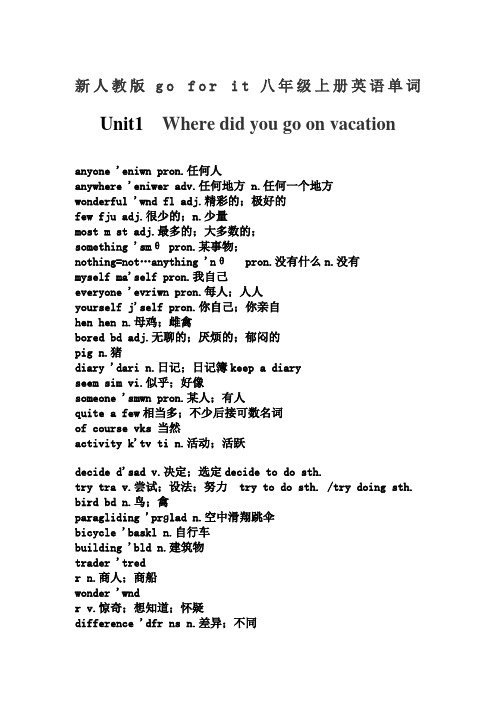
新人教版g o f o r i t八年级上册英语单词Unit1 Where did you go on vacationanyone 'eniwn pron.任何人anywhere 'eniwer adv.任何地方 n.任何一个地方wonderful 'wnd fl adj.精彩的;极好的few fju adj.很少的;n.少量most m st adj.最多的;大多数的;something 'smθ pron.某事物;nothing=not…anything 'nθ pron.没有什么n.没有myself ma'self pron.我自己everyone 'evriwn pron.每人;人人yourself j'self pron.你自己;你亲自hen hen n.母鸡;雌禽bored bd adj.无聊的;厌烦的;郁闷的pig n.猪diary 'dari n.日记;日记簿keep a diaryseem sim vi.似乎;好像someone 'smwn pron.某人;有人quite a few相当多;不少后接可数名词of course vks 当然activity k'tv ti n.活动;活跃decide d'sad v.决定;选定decide to do sth.try tra v.尝试;设法;努力 try to do sth. /try doing sth. bird bd n.鸟;禽paragliding 'prɡlad n.空中滑翔跳伞bicycle 'baskl n.自行车building 'bld n.建筑物trader 'tredr n.商人;商船wonder 'wndr v.惊奇;想知道;怀疑difference 'dfr ns n.差异;不同top tp n.顶部;顶wait wet v.等;等待wait forumbrella m'breln.伞;雨伞wet wet adj.湿的;雨天的below b'l prep.低于;在...下面adv.在下面as z conj.如同;像...一样enough 'nf adj.足够的adv.足够地;充分地duck dk n.鸭肉;鸭hungry反full 'hɡri adj.饥饿的;渴望的feel likedoing sth.想要dislike ds'lak v.不喜欢;厌恶 n.不喜爱;厌恶;反感because of因为;由于have a good time=enjoy oneself=have fundoing sth.玩得痛快Unit2 How often do you exercisehousework 'haswk n.家务劳动hardly 'hɑdli adv.几乎不;简直不;刚刚ever 'evr adv.曾经;在任何时候once wns adv.一次;曾经twice twas adv.两倍;两次Internet 'nt net n.因特网program 'pr ɡr m n.节目;程序;课程;节目单full fl adj.满的;充满的;完全的swing sw n.摇摆;秋千v.摇摆;旋转maybe 'mebi adv.或许;也许;可能swing dance摇摆舞least list adj.最小的;最少的at least至少hardly ever很少;几乎从不;难得junk n.垃圾;废旧杂物coffee 'kfi n.咖啡;咖啡色health helθ n.健康;人的身体或精神状态result r'zlt .结果;后果percent p'sent adj.百分之...的online n'lan adj.在线的adv.在线地television 'telvn n.电视机;电视节目although l'e conj.虽然;尽管;然而;可是through θru prep.穿过;凭借;一直到body 'bdi n.身体mind mand .头脑;想法;意见;心思such st adj.这样的;如此的together t'ɡeer adv.共同;一起die da v.死;枯竭;消失writer 'ratr n.作者;作家dentist 'dentst n.牙科医生magazine 'm ɡzin n.杂志however ha'evr adv.然而;无论如何;不管多么than e n conj.比almost 'lm st adv.几乎;差不多none nn pron.没有人;没有任何东西,毫无less les adj.更少的;较少的point pnt n.看法;要点;重点;小数点;目标;分数such as例如;诸如junk food n.垃圾食品;无营养食品more than超过;多于;不仅仅;非常less than不到;少于Unit3 I'm more outgoing than my sister. outgoing 'atɡ adj.外向的better 'betr adj.更好的;较好的 adv.更好地loudly 'ladli adv.大声地;高声地;花俏地quietly 'kwatli adv.安静地;悄悄地;平静地hard-working hɑd'wk adj.勤勉的;努力工作的competition kmp'tn n.竞争;比赛fantastic fn'tstk adj.极好的;了不起的which adj.哪一个;哪一些pron.哪一个;哪些clearly 'klli adv.清楚地;显然地win wn v.赢;赢得;获胜;获得n.胜利though conj.虽然;尽管;adv.不过care about关心talented 'tlntd adj.有才能的;有天赋的truly 'truli adv.真实地;真诚地;正确地care ker v.关心;担忧;照顾;在乎serious 'sris adj.严肃的;严重的;庄重的mirror 'mrr n.镜子;反映necessary 'nessri adj.必要的;必然的both b θ adj.两者都pron.两者should d aux.应该;可能;应当;将要touch tt vt.触摸;感动reach rit v.到达;伸出;达成;取得联系;延伸;伸手去够heart hɑt n.心脏;内心fact f kt n.事实;真相;实际break brek v.打碎;折断;违背;解决;中断laugh lɑf v.发笑;笑;嘲笑 n.笑声;笑;笑料similar 'smlr adj.类似的share er vt.分享,共享;分配;共有loud lad adj.大声的;adv.大声地;响亮地primary 'pram ri adj.最初的,最早的be different from和...不同information nf'men n.信息;情报;资料;通知as long as只要bring out拿出;推出the same as与...同样的in fact事实上;实际上;确切地说be similar to类似于;与...相似Unit4 What's the best movie theatertheater 'θt n.剧场;电影院;戏院comfortable 'kmft bl adj.舒适的;充裕的seat sit n.座位;screen skrin n.屏幕;银幕close kl s v.关;合拢;不开放;停业worst wst adj.最坏的;最差的cheaply 'tipli adv.廉价地;粗俗地song s n.歌曲;歌唱choose tuz v.选择;决定carefully 'kefli adv.小心地,认真地reporter r'ptr n.记者fresh fre adj.新鲜的;清新的comfortably 'kmft bli adv.舒服地;容易地;充裕地worse ws adj.更坏的;更差的service 'svs n.服务pretty 'prti adv.相当地adj.漂亮的menu 'menju n.菜单act kt v.行动;表演meal mil n.一餐;膳食so far到目前为止;迄今为止no problem没什么;不客气creative kri'etv adj.创造的,创造性的;performer p'fmr n.表演者;执行者talent 'tlnt n.天赋;才能,才艺;common 'km n adj.常见的;共同的;普通的magician m'dn n.魔术师;术士beautifully 'bjutfli adv.美丽地;完美地;role r l n.作用;角色winner 'wnr n.获胜者prize praz n.奖品;奖金everybody 'evribdi pron.每人;人人example ɡ'zɑmpl n.例子;榜样poor pr adj.可怜的;贫穷的seriously 'srisli 严重地,严肃地give ɡv v.给;赠予;送crowded 'kradd adj.拥挤的have…in common有相同特征all kinds of各种各样;各种类型be up to是…….的职责;由…….决定play a role发挥作用;有影响makeup编造for example例如take…seriously认真对待Unit5 Do you want to watch a game showsitcom 'stkm n.情景喜剧 = situation comedynews njuz n.新闻;消息soap s p n.肥皂;肥皂剧educational edu'kenl adj.教育的;有教育意义的plan pl n n.计划;方法v.打算;计划hope h p .希望;期望;盼望n.希望discussion d'skn n.讨论;谈论stand st nd v.站立;忍受happen 'hpn vi.发生;碰巧;出现;偶遇may me aux.可以,能够;可能,也许expect k'spekt v.预期;期待;盼望joke dk n.笑话;玩笑v.说笑话;开玩笑comedy 'km di n.喜剧;滑稽;幽默事件find out查明、弄清meaningless 'minls adj.无意义的;不重要的action 'kn n.行为;活动cartoon kɑ'tun n.卡通;漫画culture 'kltr n.栽培;文化;教养famous 'fem s adj.着名的;有名的appear 'pr vi.出现;出版;显得become b'km v.变成;成为rich rt adj.富有的;富饶的;丰富的successful s k'sesfl adj.成功的;圆满的might mat aux.可能;也许;may的过去式main men adj.主要的;最重要的reason 'rizn n.原因;理由film flm n.电影unlucky n'lki adj.倒霉的;不幸的;不吉利的lose luz vt.丢失;失败vi.失败ready 'redi adj.准备好的;乐意的character 'krktr n.个性;品质;人物;simple 'smpl adj.简单的;朴素的;单纯的;笨的army 'ɑmi n.军队;陆军;一大批action movie动作片be ready to愿意迅速做某事dress up装扮;乔装打扮take sb.’s place代替;替换do a good job工作干得好;做得好Unit6 I'm going to study computer science.doctor 'dktr 医生engineer end'nr 工程师violinist va'lnst 小提琴手pilot 'pal t 飞行员pianist 'pnst 钢琴家scientist 'santst 科学家college 'kɑld 大学education edu'ken 教育medicine 'medsn 药,医学university jun'vrs ti 大学,高等学府article 'ɑrtkl 文章,论文send send 邮寄,发送grow up长大成长computer programmer计算机管理员be sure about确信make sure确保resolution rez'lun 决心,决定foreign 'fr n 外国的able ebl 能够discuss dsks 讨论,商量promise prɑms 承诺,诺言beginning bɡn 开头,开端improve m pruv 改进,改善physical 'fzkl 身体的self-improvement selfmp'ruvm nt 自我改进,自我提高hobby 'hɑbi 业余爱好own on 自己的,本人的,拥有personal 'prs nl 个人的,私人的relationship r'lenp 关系write down写下have to do with关于;与……有关系take up学着做;开始做agree with同意be able to能够做某事Unit 7 Will people have robots paper 'pep r 纸pollution p'lun 污染;污染物prediction pr'dkn 预测future 'fjutr 未来pollute p'lut 污染environment n'varnmnt 环境planet 'pl nt 行星earth rθ n.地球;泥土plant pl nt 种植,植物part pɑrt 参加,部分peace pis 和平sky ska 天空play apart参与astronaut 'strnt 宇航员apartment 'pɑrtm nt 公寓房间rocket 'rɑkt 火箭;space spes .空间;太空even 'ivn 甚至;愈加human 'hjum n 人的;n.人;人类servant 'srv nt 仆人dangerous 'dendrs 危险的already l'redi 已经factory 'f ktri 工厂believe b'liv 相信disagree ds'ɡri 不同意shape ep 形状fall fl 倒塌;跌倒possible 'pɑs bl 可能的probably 'prɑb bli 大概;或许;很可能holiday 'hɑl de 假日word wrd 单词;space station太空站over and over again多次;反复地hundreds of许多;大量;成百上千fall down突然倒下;跌倒;倒塌look for寻找;寻求Unit 8 How do you make a banana milk shakeblender 'blend r 搅拌器;果汁机peel pil vt.剥落;削皮pour pr pour pr 倒;倾倒yogurt 'joɡrt 酸奶;honey 'hni 蜂蜜watermelon 'wtrmeln 西瓜spoon spun 勺,调羹add d 增加finally 'fan li 最后,最终salt slt 盐sugar 'ɡr 糖cheese tiz 干酪,奶酪popcorn 'pɑpkrn 爆米花corn krn 玉米,谷物machine m'in 机器sandwich 's nwt 三明治butter 'bt r 黄油,奶油turkey 'trki 火鸡lettuce 'lets 莴苣,生菜piece pis 件;篇;片;块;traditional tr'dnl 传统的traveler 'trvl 旅行者England 'ɡlnd 英格兰;英国celebrate 'selbret 庆祝;庆贺pepper 'pep r 胡椒粉;辣椒oven 'vn 烤箱;烤炉cover 'kv r 遮盖,盖子,gravy 'ɡrevi 肉汁;肉汤serve srv 接待,服务temperature 'tempr tr 温度,气候Unit 9 Can you come to my party prepare pr'per v.预备;准备exam ɡ'z m 考试available 'vel bl 可得到的;有空的;hang h 悬挂;使低垂until n'tl 直到...的时候;直到…为止catch k t 赶上;抓住;捕捉invite n'vat 邀请accept k'sept 接受;refuse r'fjuz 拒绝invitation nv'ten 邀请;邀请函reply r'pla 回答,回复forward 'frw rd 转交;发送,向前的delete d'lit 删除preparation prep'ren 准备,准备工作opening 'opn 开幕式,落成典礼guest ɡest 客人concert 'kɑns rt 音乐会headmaster hed'mstr 校长event 'vent 大事,公开活动calendar 'k lnd r 日历,日程表Unit10 If you go to the party,you 'll have a greattimevideo 'vdio 录像,录像带organize 'rɡnaz 组织,筹备chocolate 'tɑkl t 巧克力upset p'set 难过,失望advice d'vas 劝告,建议travel 'tr vl 旅行agent 'ednt 代理人,经纪人expert 'eksprt 专家,能手teenager 'tin ed 青少年normal 'nrml 正常的unless n'les 除非,如果不certainly 'srtnli 当然,肯定wallet 'wɑlt 皮夹,钱包worried 'wrid 担心的,烦恼的angry 'ɡri 生气的,发怒的careless 'kerl s 粗心的,不小心的understanding ndr'stnd 善解人意的,体谅人的trust trst 相信,信任mistake m'stek 错误,失误careful 'kerfl 小心的,细致的advise d'vaz v劝告,建议solve sɑlv 解决;解答experience k'spri ns 信任,经历halfway hf'we中途的adv.半路地else els 别的,其他的。
七年级英语下学期Unit10 Where did you go on vacation 说课课件 人教新目标版

What did he/she/they do last weekend?
He studied for his exam. He played chess.
They danced.
He played
basketball.
What did he/she/they do last weekend?
He played the drums.
He went to New York City.
Where did he/she/they go on vacation?
He went swimming.
He stayed at home and watched TV.
Where did he/she/they go on vacation?
教学内容分析
本单元我们将通过学习讨论节假日的活动,进 一步学习一般过去时的用法.(在unit9我们已经 学过一般过去时的用法)A部分是基本的语言内容 ,包括本单元的重点词汇、任务型听力练习、 对话练习及语法重点(Grammar Focus).B部分是知 识的扩展和综合的语言运用,包括词汇扩展、 语言知识综合运用及各类阅读文章,并附有自 测(Self Check)部分,用来自我检测本单元所学的 知识. 通过本单元的学习,使同学们之间可以畅 谈过去发生的事件,还可以用英语日记的形式 记录一天的活动并表达感想。
1.Where did Vera go on vacation?
She went to Tokyo with her family.
2.Did Vera like her vacation?
Yes, she did.
Listen again and fill in chart.
七年级英语 Unit 10 Where did you go on vacation 人教新目标版
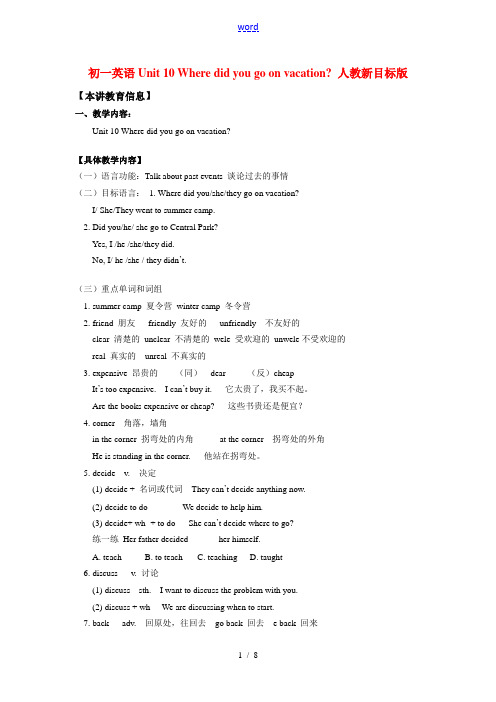
初一英语Unit 10 Where did you go on vacation? 人教新目标版【本讲教育信息】一、教学内容:Unit 10 Where did you go on vacation?【具体教学内容】(一)语言功能:Talk about past events 谈论过去的事情(二)目标语言:1. Where did you/she/they go on vacation?I/ She/They went to summer camp.2. Did you/he/ she go to Central Park?Yes, I /he /she/they did.No, I/ he /she / they didn’t.(三)重点单词和词组1. summer camp 夏令营winter camp 冬令营2. friend 朋友friendly 友好的unfriendly 不友好的clear 清楚的unclear 不清楚的wele 受欢迎的unwele不受欢迎的real 真实的unreal 不真实的3. expensive 昂贵的(同)dear (反)cheapIt’s too expensive. I can’t buy it. 它太贵了,我买不起。
Are the books expensive or cheap? 这些书贵还是便宜?4. corner 角落,墙角in the corner 拐弯处的内角at the corner 拐弯处的外角He is standing in the corner. 他站在拐弯处。
5. decide v. 决定(1) decide + 名词或代词They can’t decide anything now.(2) decide to do We decide to help him.(3) decide+ wh- + to do She can’t decide where to go?练一练Her father decided ______ her himself.A. teachB. to teachC. teachingD. taught6. discuss v. 讨论(1) discuss sth. I want to discuss the problem with you.(2) discuss + wh- We are discussing when to start.7. back adv. 回原处,往回去go back 回去 e back 回来n. 背部,后面,后部in/ at the back of…在……后面at the back of the house(反) in front of / in the front of8. the Great Wall 长城He who does not reach the Great Wall is not a true man.不到长城非好汉。
Unit10where did you go on vacation 课件.ppt

Language Points: A.on vacation/ on holiday
take/have a vacation/holiday e.g. Where did you go on vacation/holiday?
Did you come here to take a vacation? B. go to the beach/mountains/the
Unit 10 Where did you go on vacation
Where did you go on vacation? I went to the mountains.
Where did you go on vacation? I went to the museums.
Where did you go on vacation?
friendly – unfriendly like - dislike G.It was sunny and hot all day.(变为否定句)
Pattern Drills: a.Where did you go on vacation? b. How was your vacation?
How did you like your vacation? what did you think of your vacation? How about your vacation? What about your vacation?
2a Conversation1 Boy: Where did you go on vacation? Nancy: I went to New York City. Boy: Oh, really? Did you go to Central Park? Nancy: Yes, I did. It was really nice. Conversation2 Girl: Where did you go on vacation? Kevin: I went to the beach.
unit-10-where-did-you-go-on-vacation-

places for vacation.
Brainstorm (集体自由讨论)
Talk about your/your friends’ vacation!
Place
Feeling
vacation
Weather
Activities
Other things
Place
Where did you go on vocation? I went to (a place )on vacation.
Leading in
Do you like vacation ? Why ?
Last winter vacation, I went to Huangyan. What did I do there ? Where did I go last winter vacation ?
Unit 10 Where did you go on vacation?
Activities
Tina Xiang Hua
went to the mountains went to New York City
Sally
stayed at home
Brad
visited his uncle
Tom
went to summer camp
Report like this:
On vacation, Tina went to the mountains. She thinks it was … Xiang Hua … He thinks it was…
Where did he go on vacation? He went to the museum. He visited museums.
- 1、下载文档前请自行甄别文档内容的完整性,平台不提供额外的编辑、内容补充、找答案等附加服务。
- 2、"仅部分预览"的文档,不可在线预览部分如存在完整性等问题,可反馈申请退款(可完整预览的文档不适用该条件!)。
- 3、如文档侵犯您的权益,请联系客服反馈,我们会尽快为您处理(人工客服工作时间:9:00-18:30)。
Unit10 Where did you go on vacation?Good morning, ladies and gentlemen. My name is Deng Qianzhen. I am a junior student from School of Foreign Languages of Gannan Normal University. I have learnt the necessities of beinga teacher, including knowledge and teaching skills. Today, I will talk about Unit10 Wheredid you go on vacation? Go for it Junior English Book. There are six periods to finish this unit. I will talk about the first period with the following ten parts.I.Teaching philosophy:According to the New English Curriculum Criterion, teacher should play as a guider and let the students play a more important role in class. So I design this class with the purpose to let the students be the center of the class. As the students are junior students, so this lesson will be more focused on the students’ ability of communication such as speaking and listening.II.Analysis of the Teaching Materials.The topic of this unit is the continuation of unit 9 as well as about the past events. By using the Simple Past Tense, which is essential in junior English, students will talk about their past. This topic is about their experiences and places they have visited on their vacations. So it helps bring back their memories and learning motivations.III.Students’ characteristicAlthough the Junior 1 has been learning English for almost a year and are having some basic knowledge. Because living in China and the surrounding environment, students are learning impassively and irregularly. But the Junior 1 has showed themselves very creative, capable and of plasticity as they’re doing so well in what they’re interested in such as games and CAI.IV.Teaching Aims and Demands1.Knowledge objectivesa.To enable the students to read, to spell, to understand the vocabulary correctly.b.To help the students ask and answer the new sentence pattern: Where did you go on vacation?2.Ability objectives.a.To improve the students’ skills of listening, speaking, reading and writing.b.To encourage the students to communicate with others using the new sentence pattern.3.Emotion objectives.a.To train the students to cooperate well in groups and in pairs.b.To be interested in communicating in English.V.Teaching Key points and difficulty1.Key pointsa.Key vocabularyNew York City camp summer camp museumb.Key structuresWhere did you go on vacation?I went to…2.difficultythe use of the new sentence patternVI.Teaching Methods1.Task-based methodThat’s to say I’ll let the students finish 1 listening task and make short dialogues along with theactions to help the students get a better understanding of the key structures.munication methodI’ll set up a dream and ask them to present themselves as reporters. This way, the students can say freely and needn’t to worry about making mistakes.VIII. Teaching AidsIn this lesson, the CAI, the cassette, a tape recorder will be used.X.Teaching procedureI’ll mainly talk about this part. It consists of 5 steps.Step 1 Warming-up and review1.Make a free talk between teacher and students. What did you do yesterday? And what didyour best friend do yesterday?2.Write down the past tenses of the verbs that I show in CAI.Purpose: this step is in order to review what the students have learnt in Unit 9. That way, I can lead them into the new lesson smoothly. I thing it’s usual but practical.Step 2 Presentation1.Learn the new words and expressions.a.lead-in: ask students some questions: Did you dream last night? What did youdream? Where did I go on vacation in my dream?b.CAI shows many pictures of my dream, which are also the activities in 1a.c.ask students to read and spell the new phrases.d.do 1a. Match the activities with these pictures (a-g).e.play a guessing game: I will show some jigsaws of each pictures and have thestudents to guess, I will praise the students who answers more quickly.Purpose: I put the vocabulary learning into a dream in order to prompt them to findit very interesting to learn English. By CAI, students can match the vocabulary withthe real things directly and master them easily.Step 3 Listening practicea.tell the students to listen to the tape and number the people (1-5) in the picture.b.play the recorder for the first time, and then check the answers.c.play the recorder again, students imitate the conversation and fill in the blanks. Pay attentionto their pronunciation and intonation.Purpose: this is a basic and necessary step. Which develops the students’skills of listening, reading and writing.Step 4 Pair worka.Teacher-student: where did Jenny go on vacation?She went to amusement park.b.ask the students to practice in pairs as we are in 1c. Then they will come to the platform andclick on the number to choose a picture and act it out randomly.Purpose: “Task-based”teaching method is used here to develop the students’ability of communication and their ability of co-operation will be well trained. This step provides guided oral practice using the target language to consolidate the key structure and it can develop students’ skill of speaking and sense of language.Step 5 ProductionHave students pretend to be reporters to interview anyone they want to ask about theirvacation.Purpose: After learning 1a-1c, it’s time to extend what they learnt just now and give the students a free space to show their abilities, With the real situations, students will feel easy and successful during this part. By way of communication, the students will understand how to use the key structure better and consolidate the knowledge firmly.XI.HomeworkDo a survey and write a report about the classmates’ vacation.Purpose: I think homework is so important that the students can speak English as much as they can in class or after class. I set this step in order to practice students’ skills of listening, speaking and writing,XII. Blackboard DesignWhere did you go on vacation?Left: new words and expressionsRight: keys of the exerciseMiddle: structure pattern。
